Planning a trip to the US national parks in January but don’t know which ones to visit? In January, much of the country is cold and covered in snow, but there are plenty of parks you can visit to escape the wintry conditions. In this article, we cover the best national parks to visit in January, plus one very cool road trip that includes several of these national parks.
About this National Park Series
This article is part of a series about the best national parks to visit each month. In this series, every national park is listed at least once and many are listed multiple times. It is a series of 12 articles, one for each month of the year. More popular parks, like Yellowstone and the Grand Canyon, may show up in as many as four of these articles, but lesser known parks like Gates of the Arctic may only show up once.
These articles take into account weather, crowd levels, the best time to go hiking, special events, road closures, and our personal experiences in the parks. Based on these factors, we picked out what we think are the optimal times to visit each park.
For an overview of the best time to visit each national park, check out our Best National Parks by Season guide. This guide has graphs that list each park and the optimal time to plan your visit.
There are a growing number of US National Parks that require an advance reservation or permit of some sort. Get the full, updated list in our article US National Parks That Require a Reservation.
Visiting the National Parks in January
Despite cold temperatures and snow along much of the northern half of the United States, January is still a wonderful month to visit the national parks.
January has one of the lowest numbers for park visitation for the entire year. Many people just took time off for the winter holidays, so travel is light in January. Not only are crowds lower at many of the national parks, if you will be hopping on an airplane, crowds tend to be lower in the airports, too.
Just keep in mind that snowstorms and bad weather can delay or cancel some flights, even if you aren’t flying out of an airport that could potentially get snow.
On this list, most of these parks are geared towards escaping the cold weather and visiting some warmer, less snow covered destinations in the USA.
IMPORTANT NOTE: The information we provide for each national park does not include temporary road closures, since these dates are constantly changing. Roads can close in the national parks at any time, so I recommend getting updates on the National Park Service website while planning your trip.
Best National Parks to Visit in January
1. Death Valley National Park
Death Valley National Park is one of the most unusual national parks in the United States. It’s also one of our favorites.
Stand in Badwater Basin, the lowest point in the United States. Visit Furnace Creek, which holds the record for the hottest recorded temperature in the world (but not something you have to worry about in January). Take in the view from Dante’s Peak, slide down the sand dunes, explore narrow canyons, and journey out to Racetrack Playa, where boulders mysteriously slide across the desert landscape.
And if you are looking for a travel destination with kids, this is a good one.
Why Visit Death Valley in January: In January, the weather is mild and rainfall is low. I wouldn’t exactly say the weather is warm, but for many people in North America and Europe, 67°F as a high in January feels downright balmy. In terms of park visitation, January is one of the least crowded months of the year to visit Death Valley, with visitation numbers being lower than both December and February.
Weather: In January, the average high is 67°F (20°C) and the average low is 43°F (6°C). Rain chances are very low.
Sunrise and Sunset: Sunrise is at 7 am and sunset is at 5 pm. The days are short, so get an early start here to maximize your time.
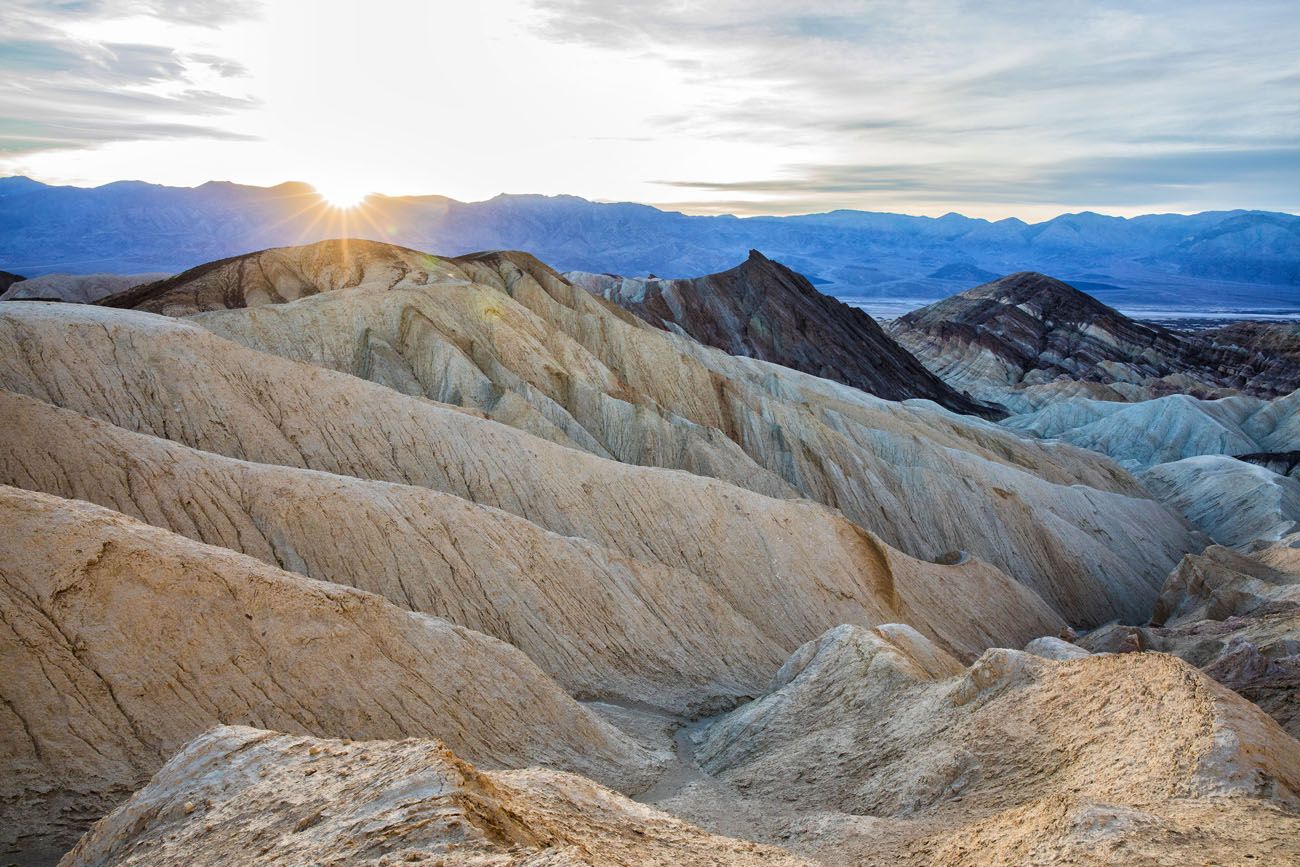
Sunset in Death Valley | Best National Parks in January
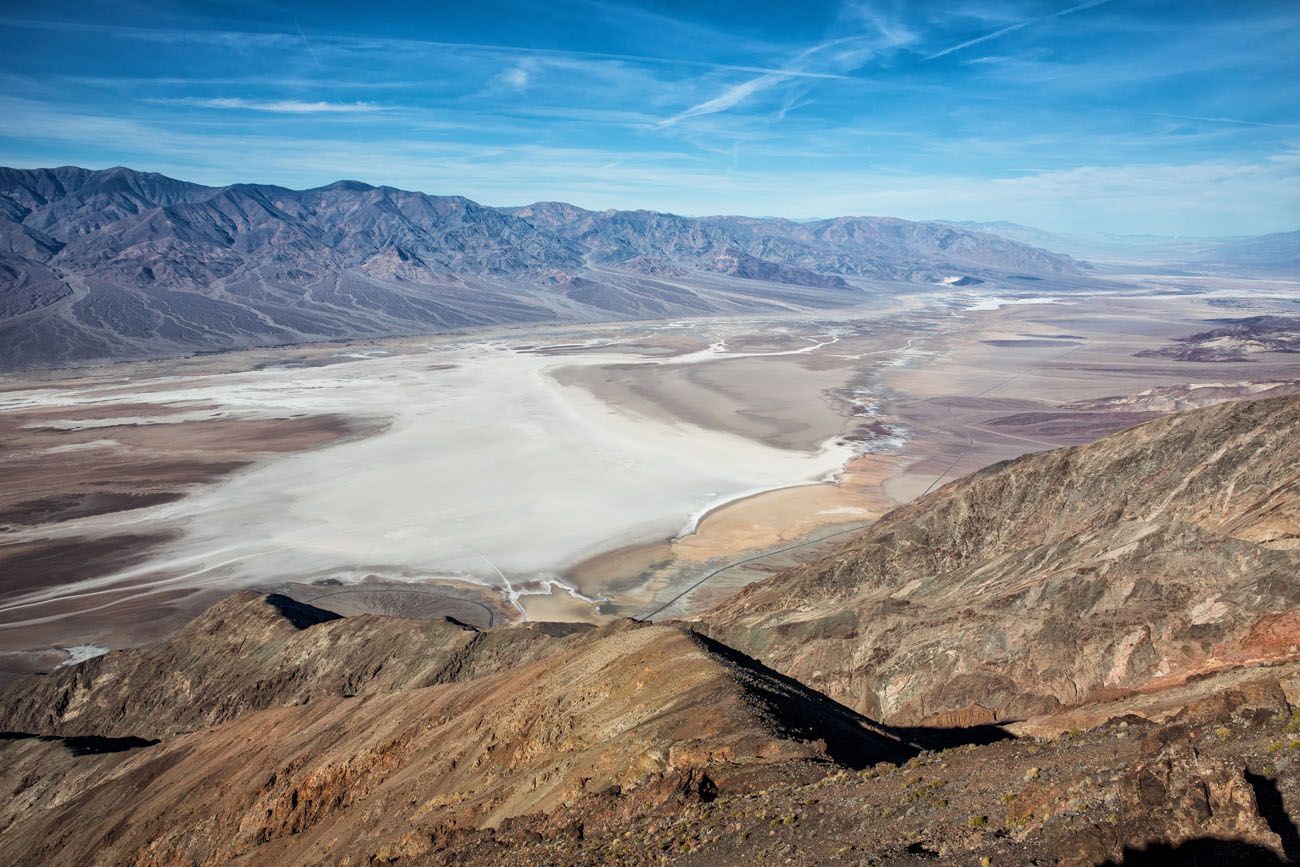
The view from Dante’s Peak | Best National Parks in January
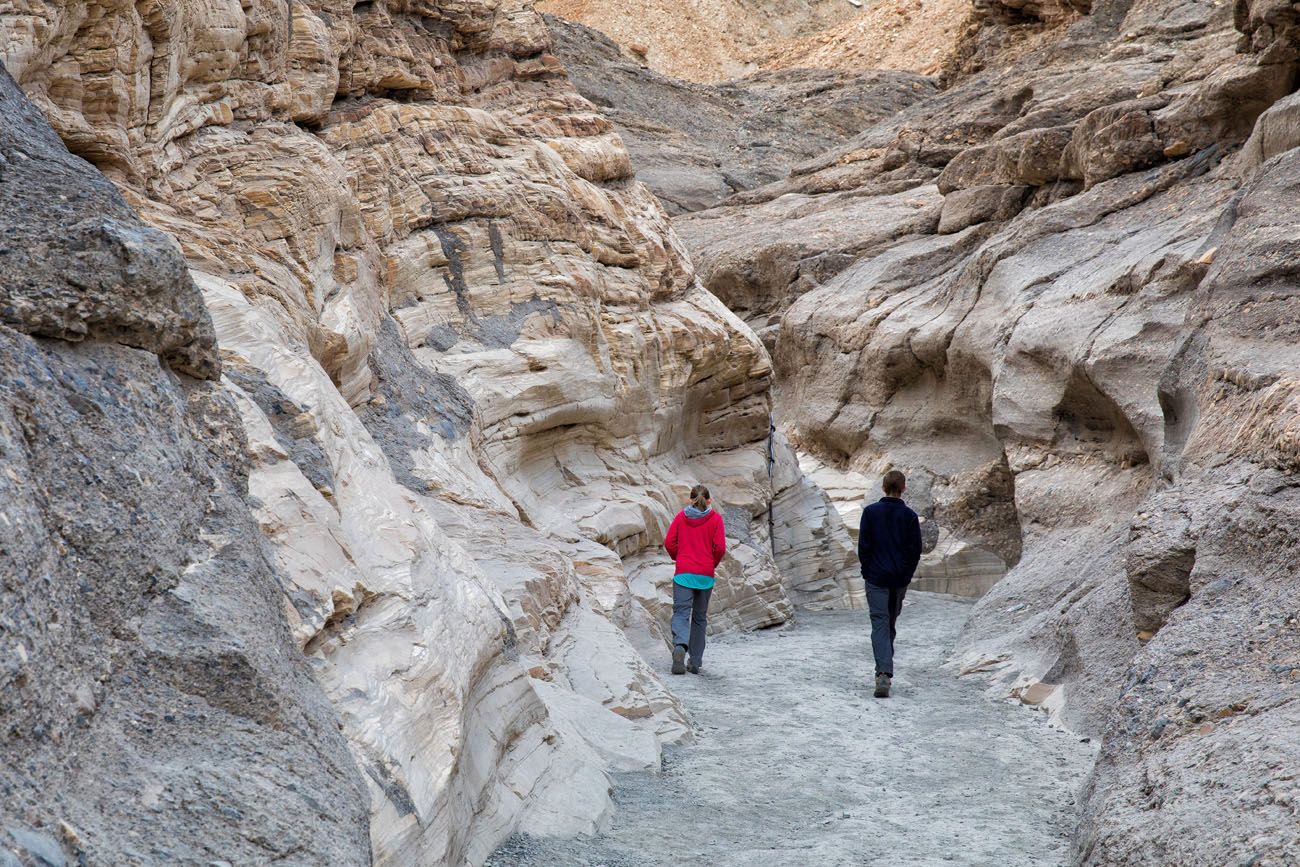
Hiking Mosaic Canyon | Best National Parks in January
Location: California
Top Experiences: Visit Zabriskie Point, drive Artist’s Drive, visit Badwater Basin, enjoy the view from Dante’s View, visit Ubehebe Crater, hike to Telescope Peak, slide down the Mesquite Flat Sand Dunes, and view the night sky.
Ultimate Adventure: For the ultimate adventure, drive out to Racetrack Playa to see the sailing stones.
Death Valley Itinerary: Ideally, plan on spending at least two days in Death Valley. With this time, you can visit the highlights and drive out to Racetrack Playa. But if you have less time, Death Valley makes a great day trip from Las Vegas.
2. Virgin Islands National Park
With pristine beaches, snorkeling spots, and secluded coves, Virgin Islands National Park is one of the most beautiful parks we have visited.
Virgin Islands is one of the few parks that when you are here, it really does feel like you are on vacation. Sip on tropical drinks in the shade of a palm tree, go stand up paddle boarding, visit the historic landmarks, or go for a hike. Or, simply spend all of your time lounging under a palm tree on a white, sandy beach.
We visited this national park in January and had an awesome experience, so the Virgin Islands is one of our top picks for this month.
Why Visit the Virgin Islands in January: The weather is perfect and for those who are looking for a beach destination, this is our top pick for January. However, January is one of the busiest months to visit the park, but the fantastic weather makes up for the higher than normal crowd levels.
Weather: In January, the average high is 84°F (29°C) and the average low is 74°F (23°C). As it gets closer to summer, the temperatures rise a few degrees, but the humidity and rain chances get much higher, making the winter months the best time to visit the Virgin Islands in terms of weather.
Sunrise and Sunset: Sunrise is at 7 am and sunset is at 6 pm.
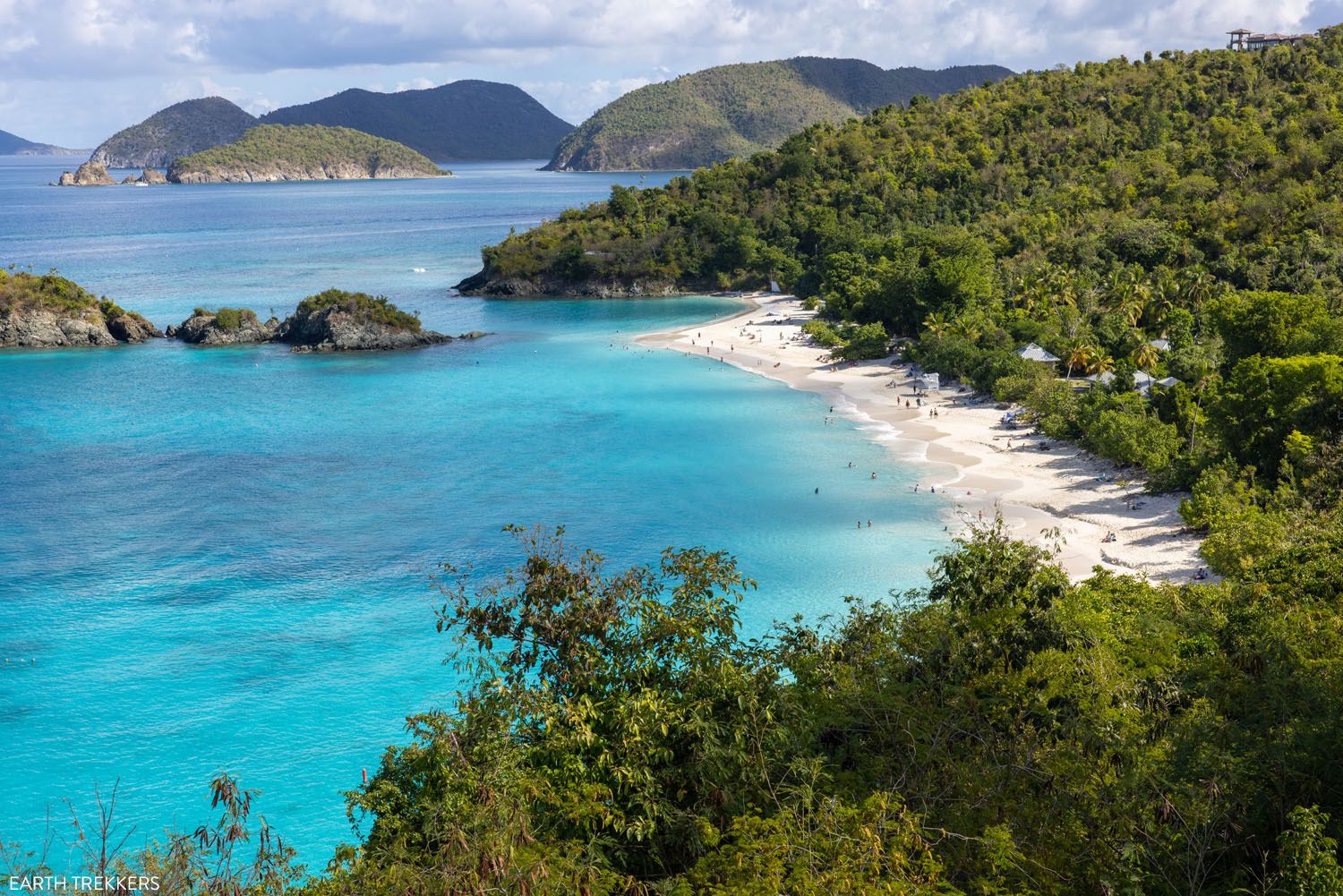
Trunk Bay | Best National Parks in January
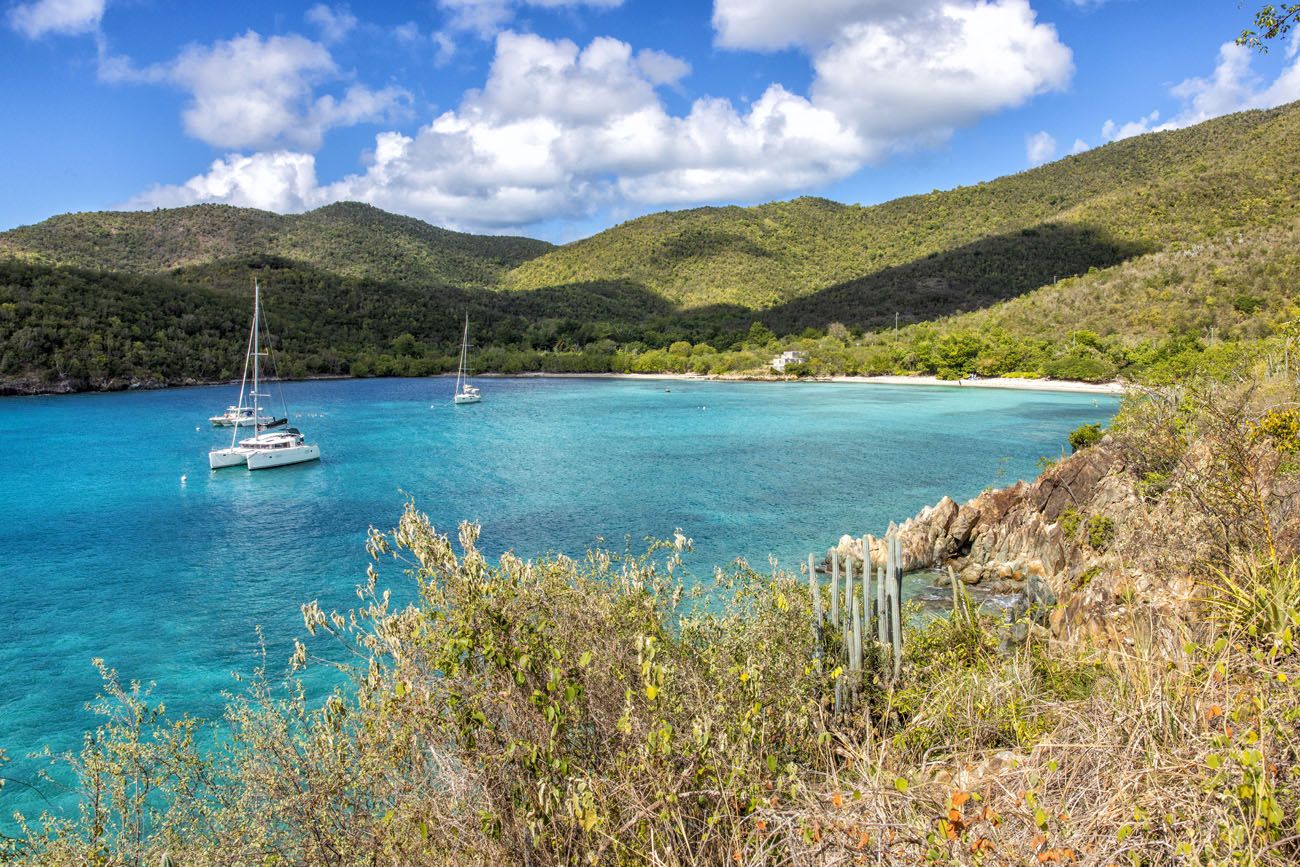
Little Lameshur Bay | Best National Parks in January
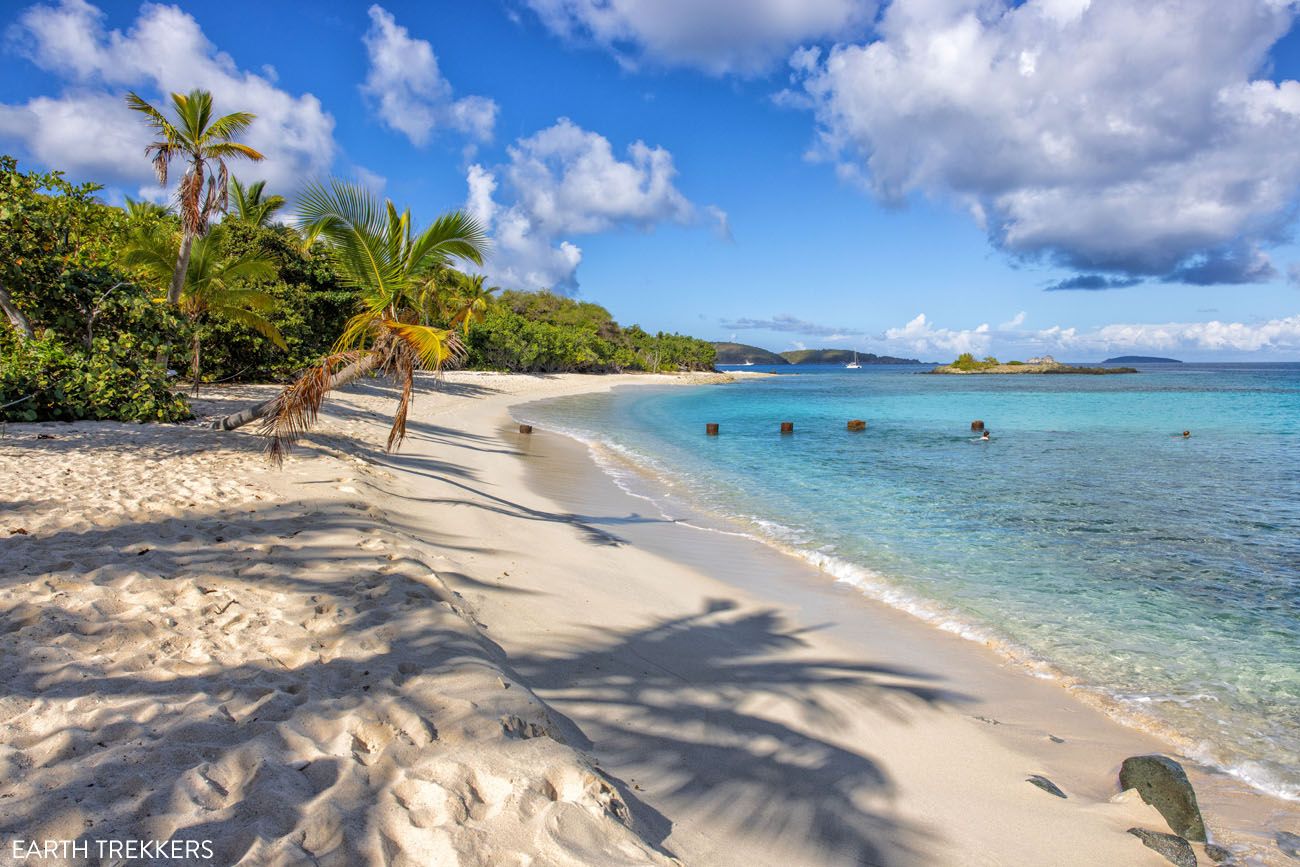
Denis Bay
Location: US Virgin Islands
Top Experiences: Visit Trunk Bay and snorkel the underwater trail, visit Maho Beach, walk the Leinster Bay Trail and snorkel in Waterlemon Bay, visit the overlooks on North Shore Road, and visit beaches along the north shore of St. John.
How Much Time Do You Need? Ideally, plan on spending three days in Virgin Islands National Park. This gives you enough time to visit the highlights, spend some time at several different beaches, and hike a trail or two.
3. Saguaro National Park
This national park is named for the Saguaro Cactus, which only grows in the Sonoran Desert.
Saguaro National Park is located in southern Arizona. Temperatures in January are relatively warm, making this a great time to visit this park.
The national park is divided into two sections. The Tuscon Mountain District, which is located to the west of Tucson, has the denser population of cacti and it is the more popular area of the park to visit.
To the east is the Rincon Mountain District. You won’t see quite as many cacti here, but the mountains form a nice backdrop for photography and this area of the park is less visited.
Why Visit Saguaro in January: This is one of the warmest parks to visit in January. And if you are planning a January road trip, a visit here can be combined with the Grand Canyon, another park that makes our best national parks in January list. However, January is one of the busiest months of the year to visit Saguaro National Park, so expect some crowds on the hiking trails and scenic drives.
Weather: In January, the average high is 66°F (19°C) and the average low is 40ºF (4°C). Rainfall chances are very low.
Sunrise and Sunset: Sunrise is at 7:20 am and sunset is at 5:40 pm.
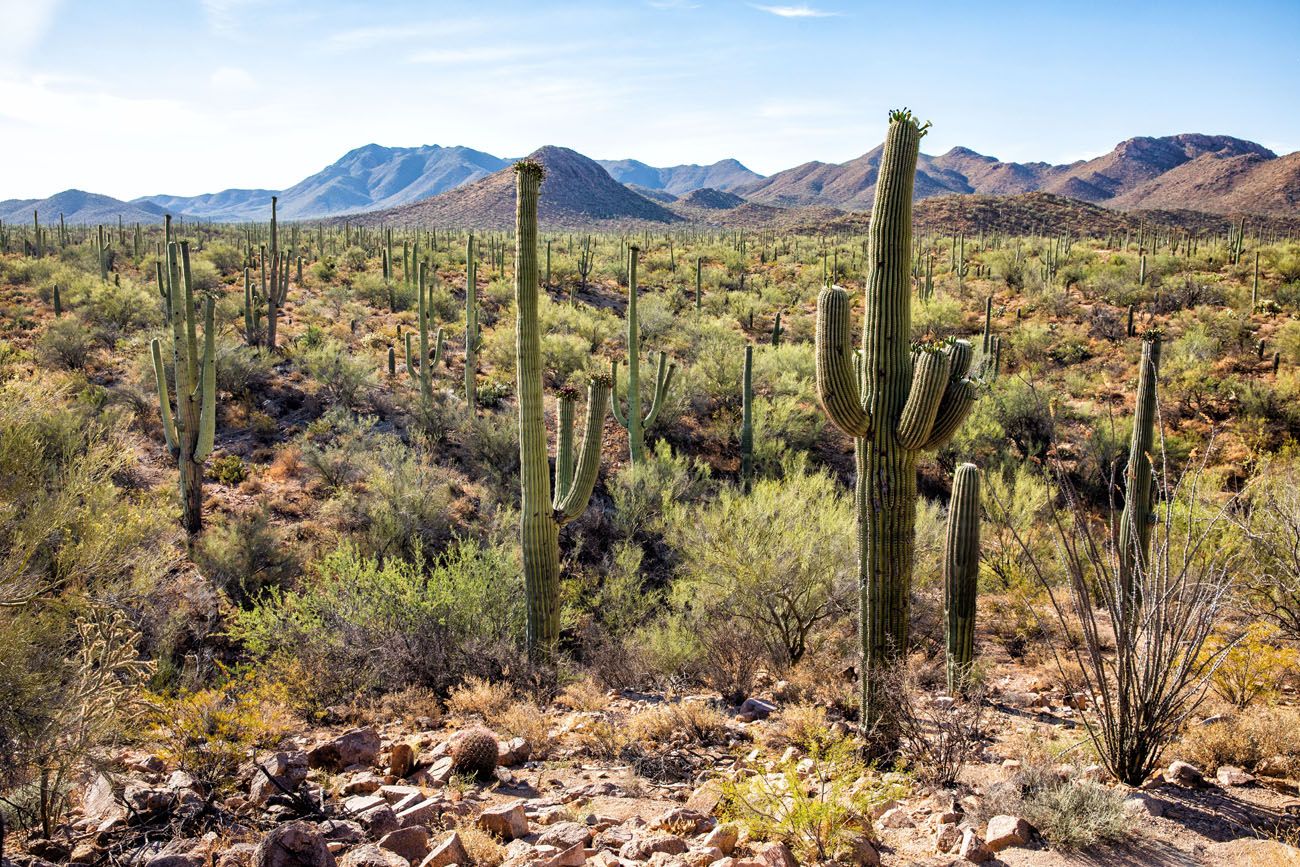
Saguaro National Park | Best National Parks in January
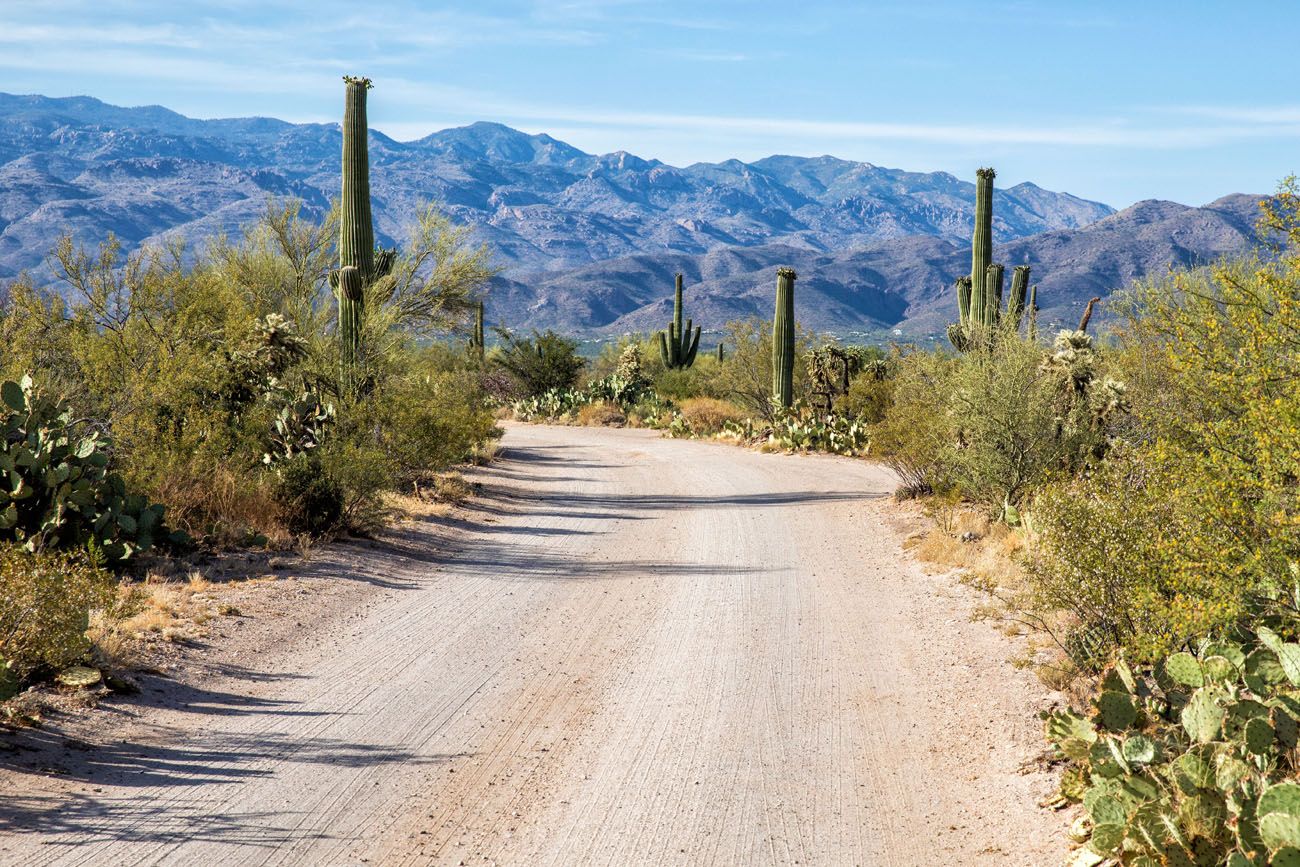
Road to the Mica View Picnic Area in Saguaro East | Best National Parks in January
Location: Arizona
Top Experiences: Drive Bajada Loop Drive, walk the Valley View Overlook Trail and the Desert Discovery Nature Trail, see the Signal Hill Petroglyphs, and drive the Cactus Forest Drive. Just outside of the park is the Arizona Sonoran Desert Museum which is well worth the time.
How Much Time Do You Need? A half to a full day is all you need to see the highlights of Saguaro National Park. With more time, you can go backpacking or hike the longer, more challenging hiking trails.
Plan Your Visit
4. Dry Tortugas National Park
Dry Tortugas National Park is an underrated park that is located in the Florida Keys. Located 70 miles west of Key West, this park makes up the last few islands of the Florida Keys.
Most people visit Dry Tortugas National Park on a day trip from Key West, getting here by seaplane or ferry. Once here, tour Fort Jefferson and walk the old fort walls, go snorkeling or swimming, and take a stroll on an empty beach.
Why Visit Dry Tortugas in January: In January, Bush Key is open. This small key sits next to Garden Key and it is closed from February through September for bird nesting season. This is a beautiful place to go on a stroll and one of our favorite experiences at Dry Tortugas, so it’s worth planning your visit for a time when this key is open. Plus, January is a good time to visit the Florida national parks if you are looking for a destination with warm weather and beaches.
Weather: In January, the average high is 74°F (23°C) and the average low is 65°F (18°C). During the winter months, brief periods of windy conditions can create large swells of water, which can cancel the ferry and make snorkeling difficult.
Sunrise and Sunset: Sunrise is at 7:15 am and sunset is at 6 pm.
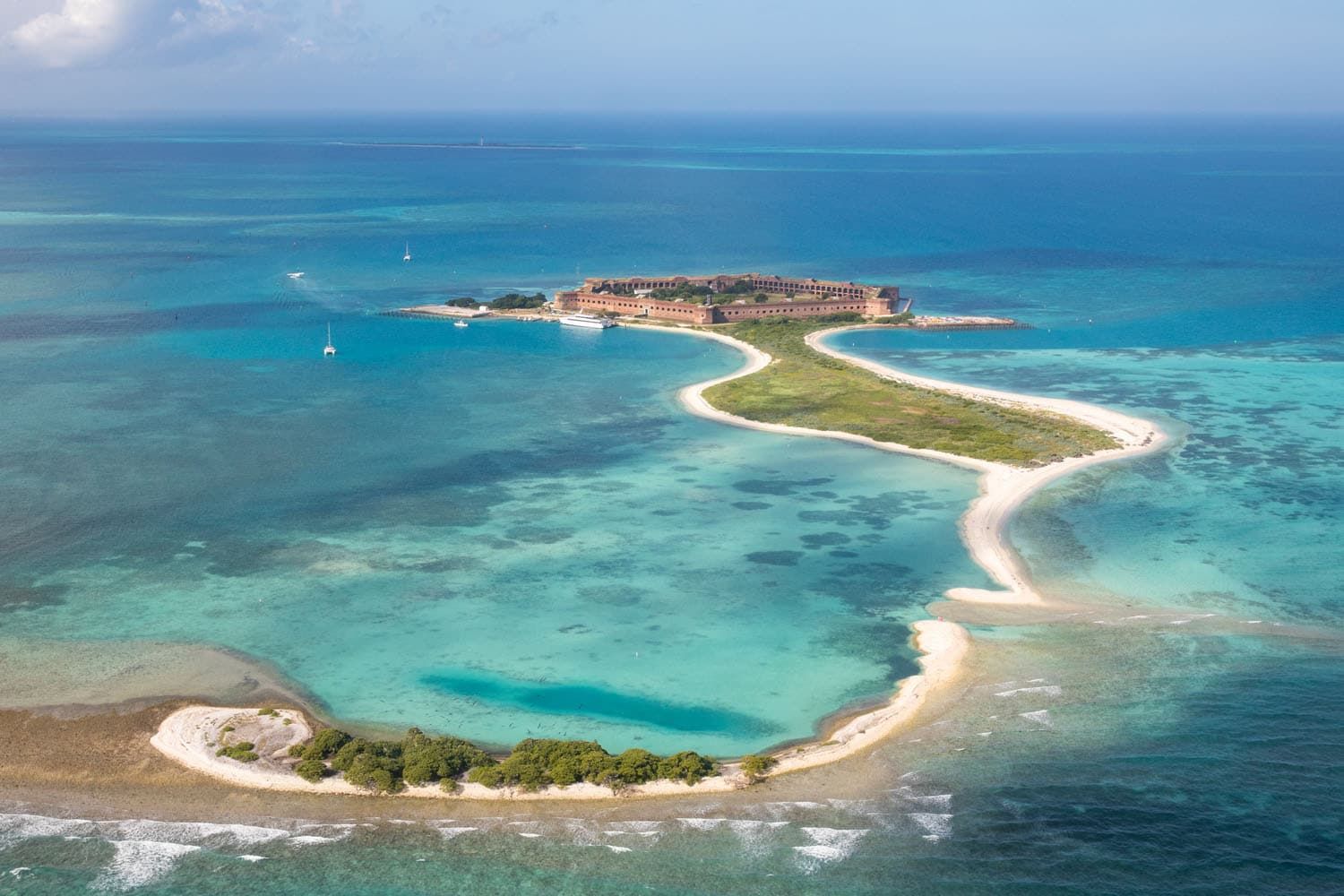
Dry Tortugas from the seaplane | Best National Parks in January
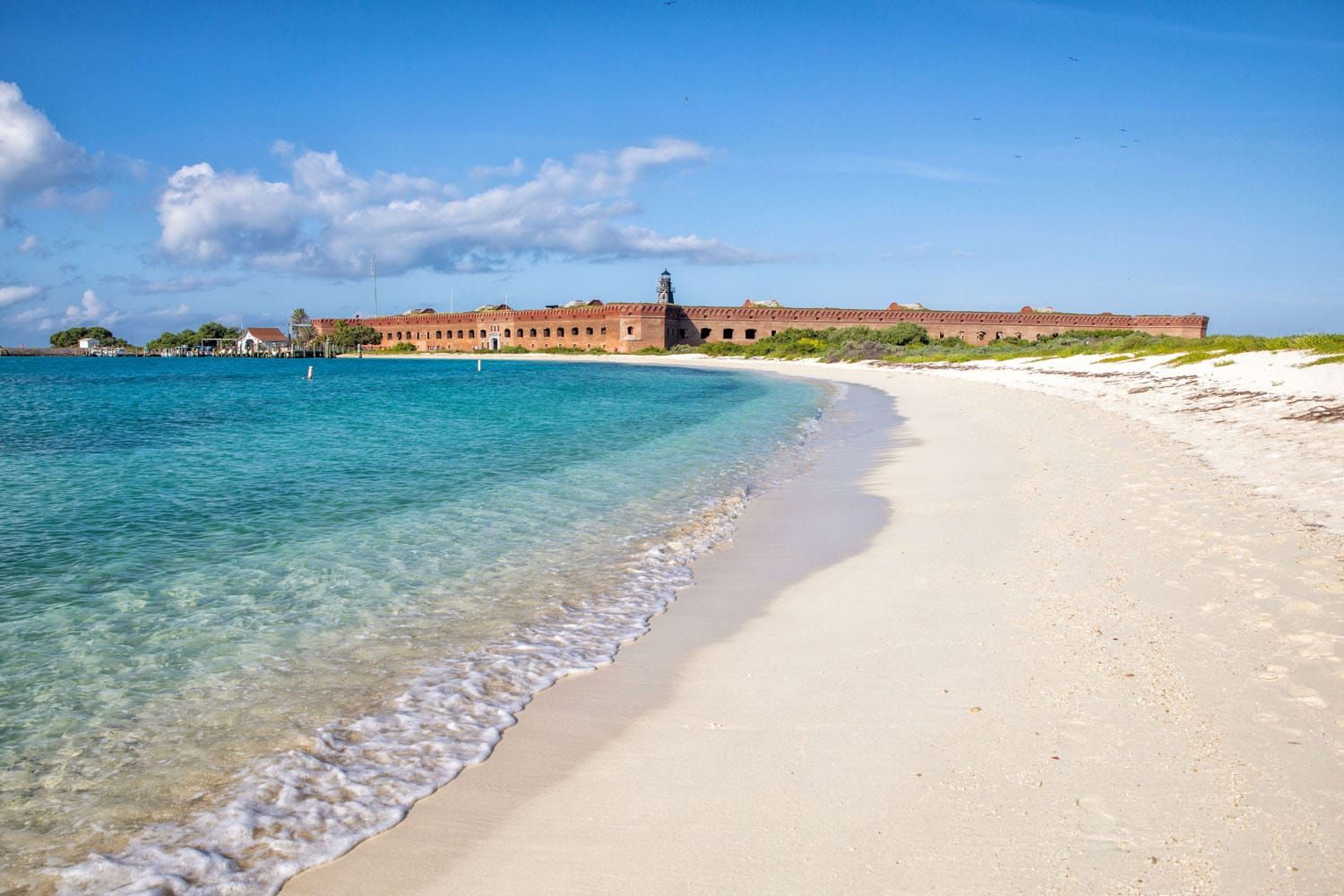
Walking on Bush Key | Best National Parks in January
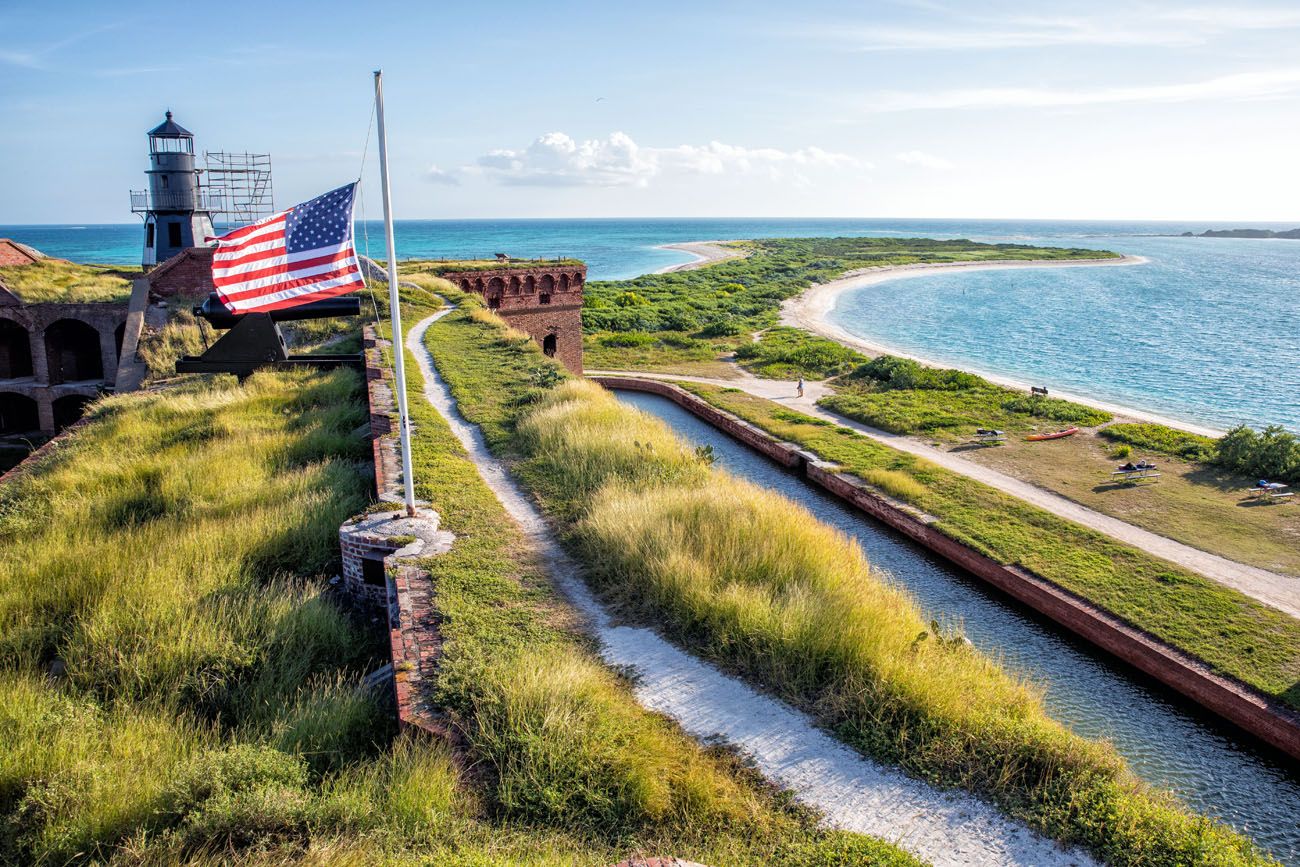
On Top of Fort Jefferson | Best National Parks in January
Location: Florida
Top Experiences: Explore Fort Jefferson, go snorkeling or swimming, and take a stroll on Bush Key.
Ultimate Adventure: For the ultimate adventure, visit Loggerhead Key. To get here, you will kayak 3 miles one-way from Garden Key. In order to do this, you will need to spend two days at the park, camping overnight on Garden Key.
How Much Time Do You Need? A half to a full day is all you need to visit Dry Tortugas National Park. It’s possible to take an early flight from Key West, spend the morning at Dry Tortugas National Park, and be back in Key West for a late lunch.
Plan Your Visit
The Complete Guide to Dry Tortugas National Park
Best Things to Do in Dry Tortugas National Park
How to Get to Dry Tortugas National Park
Florida Keys Road Trip Itinerary: Miami, Key West & the National Parks

5. Everglades National Park
Everglades is the most popular national park to visit in Florida, since it is easy to get to and easy to visit. In just one day, you can hike a few short trails, spot manatees and crocodiles, and go on an airboat ride.
This is a great national park to add to a Florida road trip, especially one that takes you to the Florida Keys, since this park is located very close to Miami. It’s also one of our top picks for kids.
Why Visit the Everglades in January: January is a great time to visit Everglades National Park because the weather is just about perfect and mosquitoes aren’t too bad (we were told by several different people that February is the best month to visit if you want the best chance of having a mosquito-free visit).
However, it’s important to know that this perfect weather and low mosquito situation makes January a prime month to visit Everglades National Park, so you will be dealing with some crowds. December through April tend to be the busiest months to visit this park.
Weather: The average high temperature is 78°F (26°C) and the average low is 55°F (13°C). January tends to be the driest month of the year.
Sunrise and Sunset: Sunrise is at 7 am and sunset is at 6 pm.
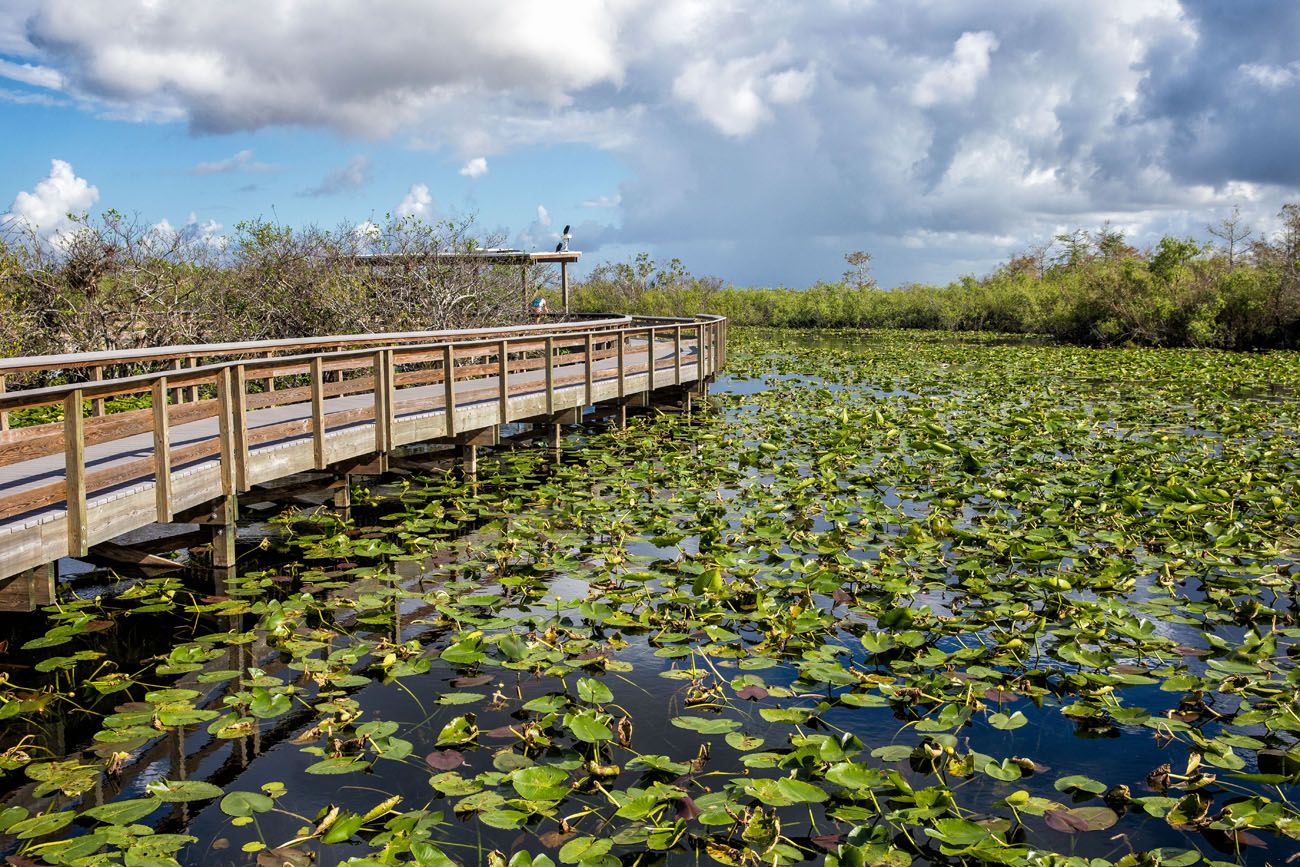
Everglades National Park | Best National Parks in January
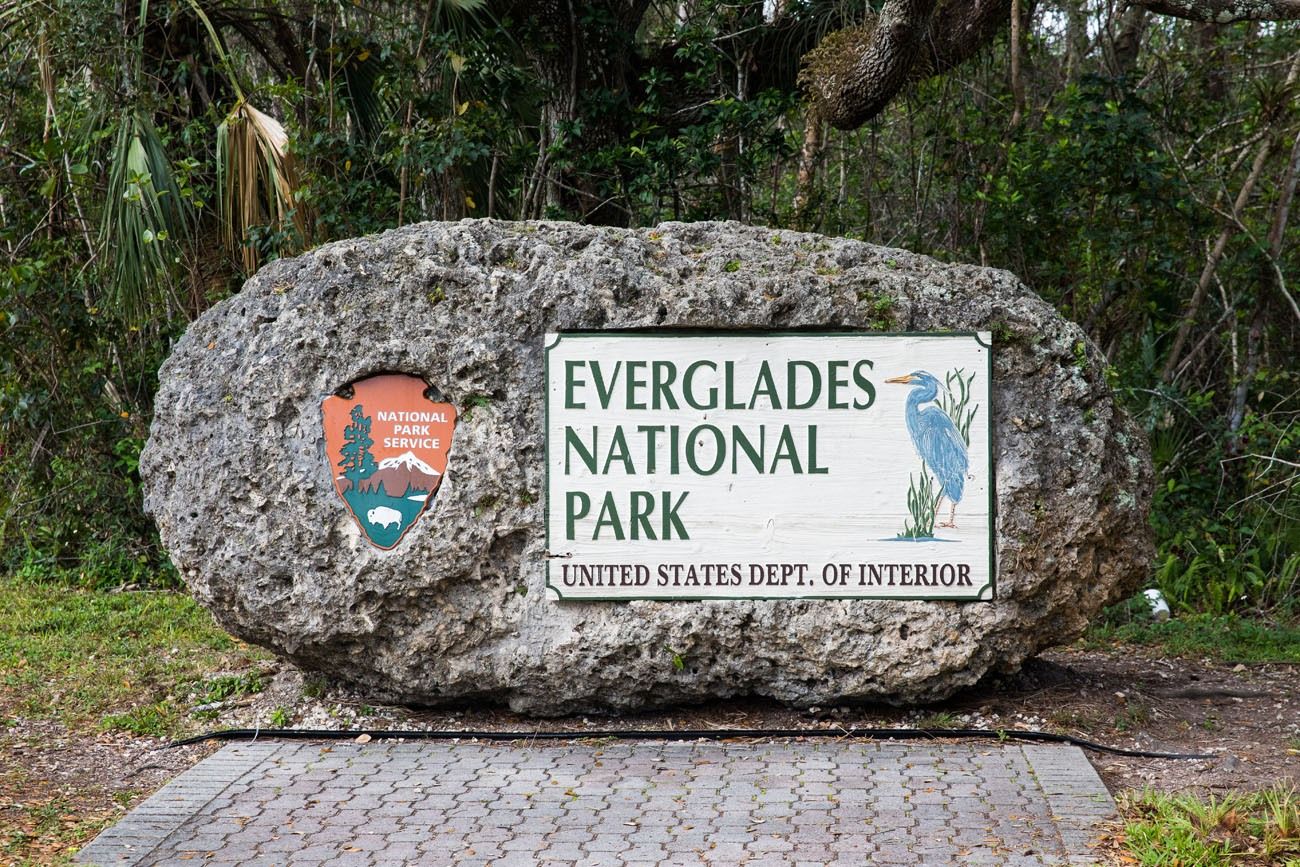
Location: Florida
Top Experiences: Walk the Anhinga Trail, visit the Flamingo Visitor Center and see if you can spot crocodiles or manatees, walk the boardwalk trail at Mahogany Hammock, take a kayaking tour, and bike through Shark Valley.
How Much Time Do You Need? One day is all you need to visit the highlights of Everglades National Park.
Plan Your Visit
6. Zion National Park
In 2023, Zion National Park was the third most visited park in the USA, getting 4.6 us natimillion visitors. Crowds are huge from early spring through fall, so, for the best experience, we recommend visiting during the off season.
January is the month with the fewest numbers of visitors to Zion. So, if you want to hike the trails with low crowds, January is the best time to go.
Why Visit Zion in January: To avoid the crowds. This is the quietest month to visit the park in terms of visitation. You can even drive your car on Zion Canyon Scenic Drive, since the park shuttle does not operate at this time.
Weather: The average high is 54°F (12°C) and the average low is 30°F (1°C), so Zion is chilly in January. There is a small chance of snow…but wouldn’t it be beautiful to see Zion with a light dusting of snow?
Sunrise and Sunset: Sunrise is at 7:45 am and sunset is at 5:40 pm, which gives you 10 hours of daylight. That’s plenty of time to hike a trail or two. Plus, you can stick around for sunset and then have a nice dinner in Springdale.
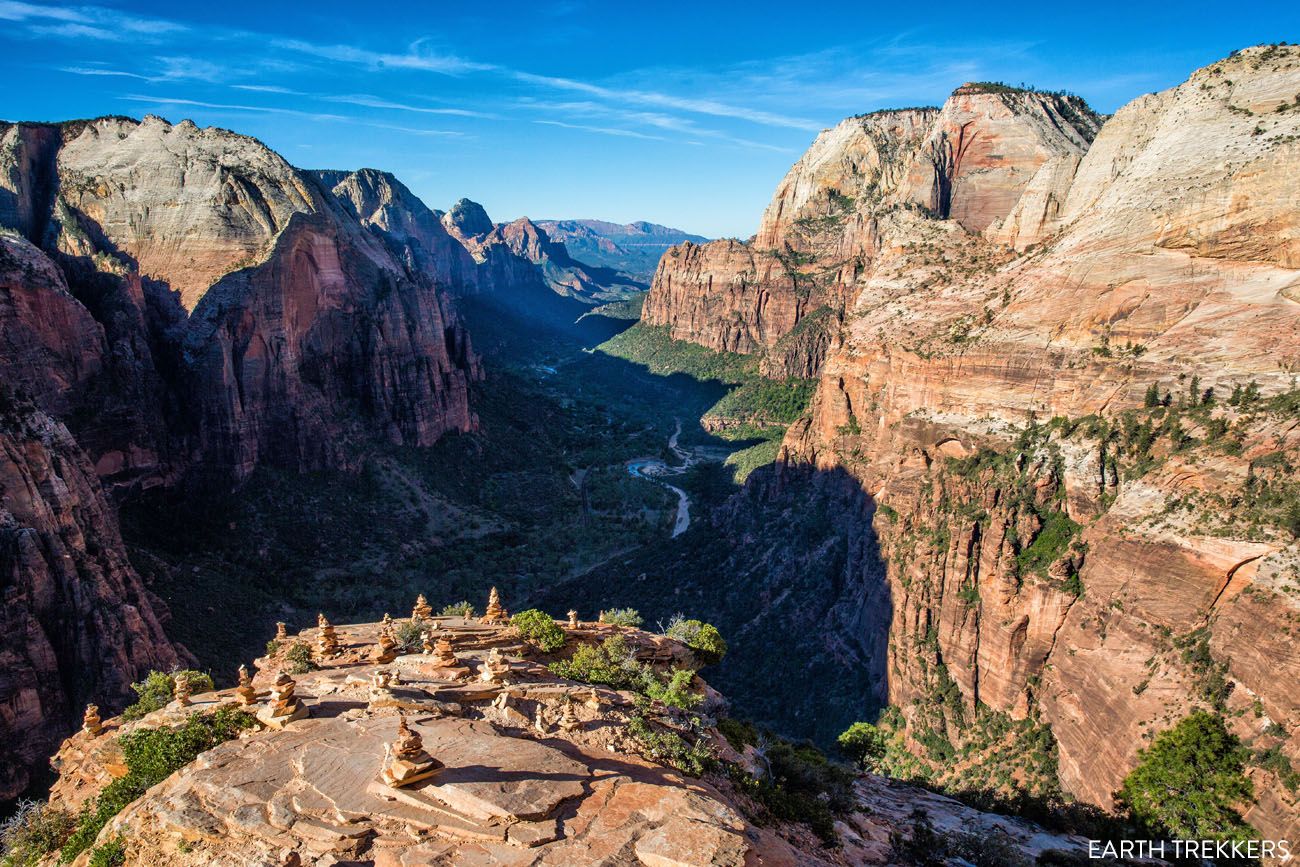
The view from Angels Landing | Best National Parks in January
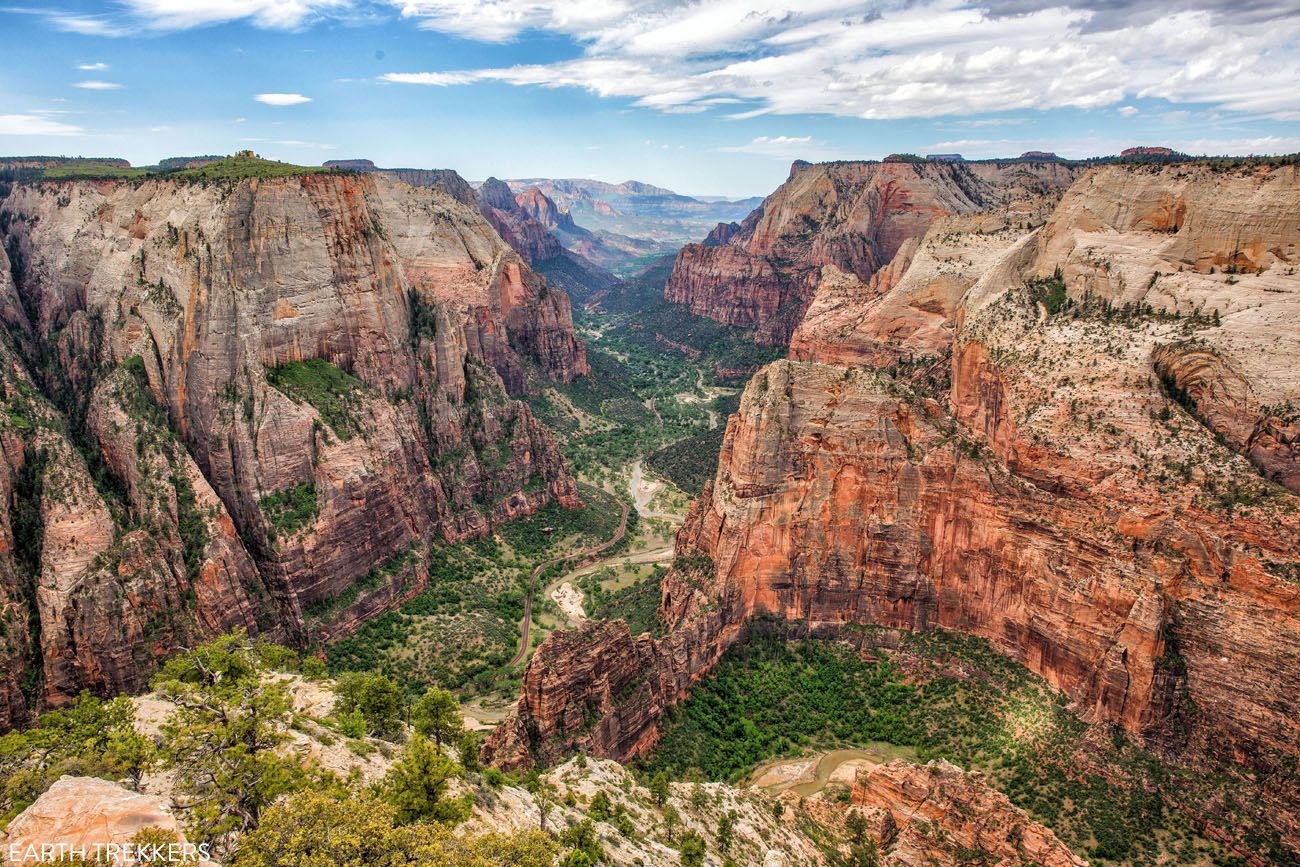
View from Observation Point | Best National Parks in January
Location: Utah
Top Experiences: Hike Angels Landing, Observation Point, Hidden Canyon, Riverside Trail, Emerald Pools, Weeping Rock, and Canyon Overlook. One of the best experiences in the park is hiking the Zion Narrows.
Ultimate Adventure: In January, you can hike the Zion Narrows from the bottom-up, just be aware that water temperatures are going to be very cold at this time.
How Much Time Do You Need? If you like hiking, plan to spend at least 2 to 3 days in Zion National Park. You can do three big hikes (one each morning) or use two of the days for a multi-day backpacking adventure. This also gives you time to explore Kolob Canyons at the northern section of the park.
7. Arches National Park
Just like Zion, January is the quietest month of the year to visit Arches National Park. This is a good thing, because Arches is another extremely popular park to visit in the USA.
Arches is a beautiful wonderland of arches, rock formations, and short hiking trails. Not only will you find over 2,000 arches here, but you will also see hoodoos, fins of sandstone rocks, massive mesas, and balanced rocks.
You can see the highlights of the park right from your car or by taking short hikes, but for those who want to venture deeper into the park, there are several very cool hikes to choose from.
Why Visit Arches in January: To take advantage of lower crowd levels. In January 2023, about 30,000 people visited Arches in January. Two months later, in March, that number rose to 130,000. May saw the most visitors, hitting 190,000 people in just that month.
We have visited Arches and Canyonlands at the very end of December. It did snow a little bit and we needed hats and gloves, at least early in the day. For some people (us included), braving chilly temperatures could be worth it to visit the park with just a fraction of the people who visit later in the year.
Weather: The weather is a little bit cooler in Arches than Zion in January. The average high is 42°F (5°C) and the average low is 22°F (-5°C). There is a chance a few inches of snow can fall in January.
Sunrise and Sunset: Sunrise is at 7:30 am and sunset is at 5:20 pm.
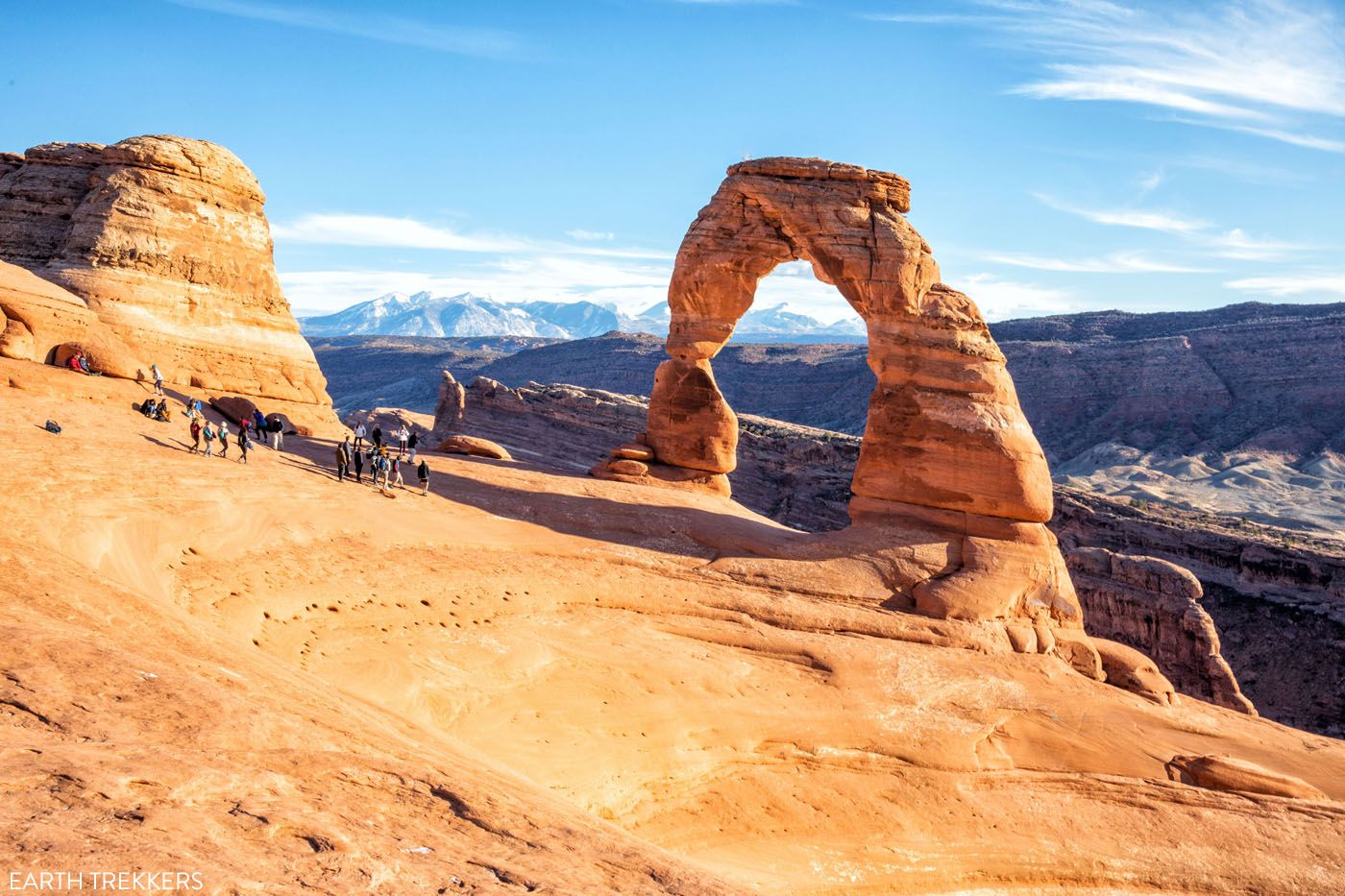
Delicate Arch | Best National Parks in January
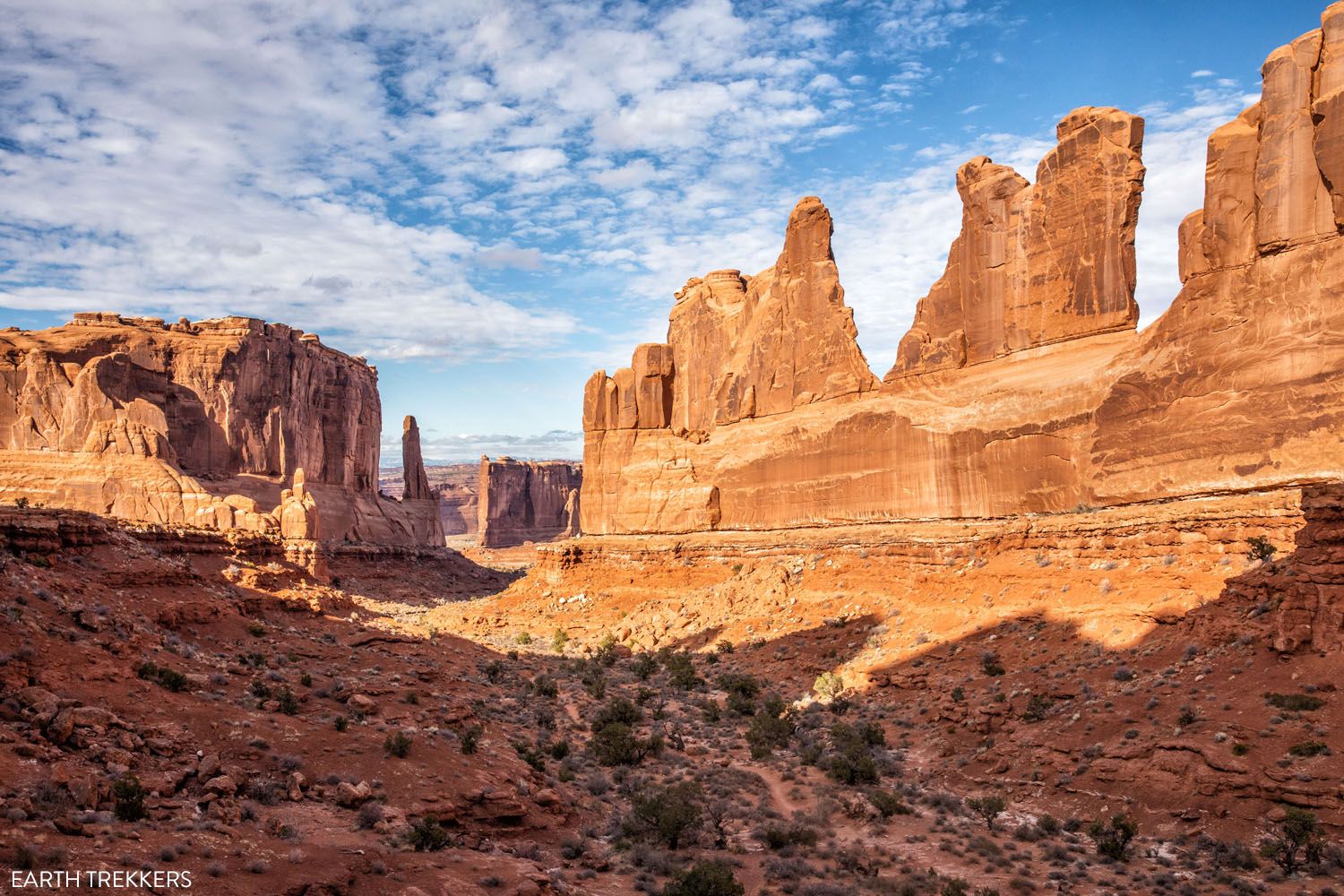
Park Avenue | Best National Parks in January
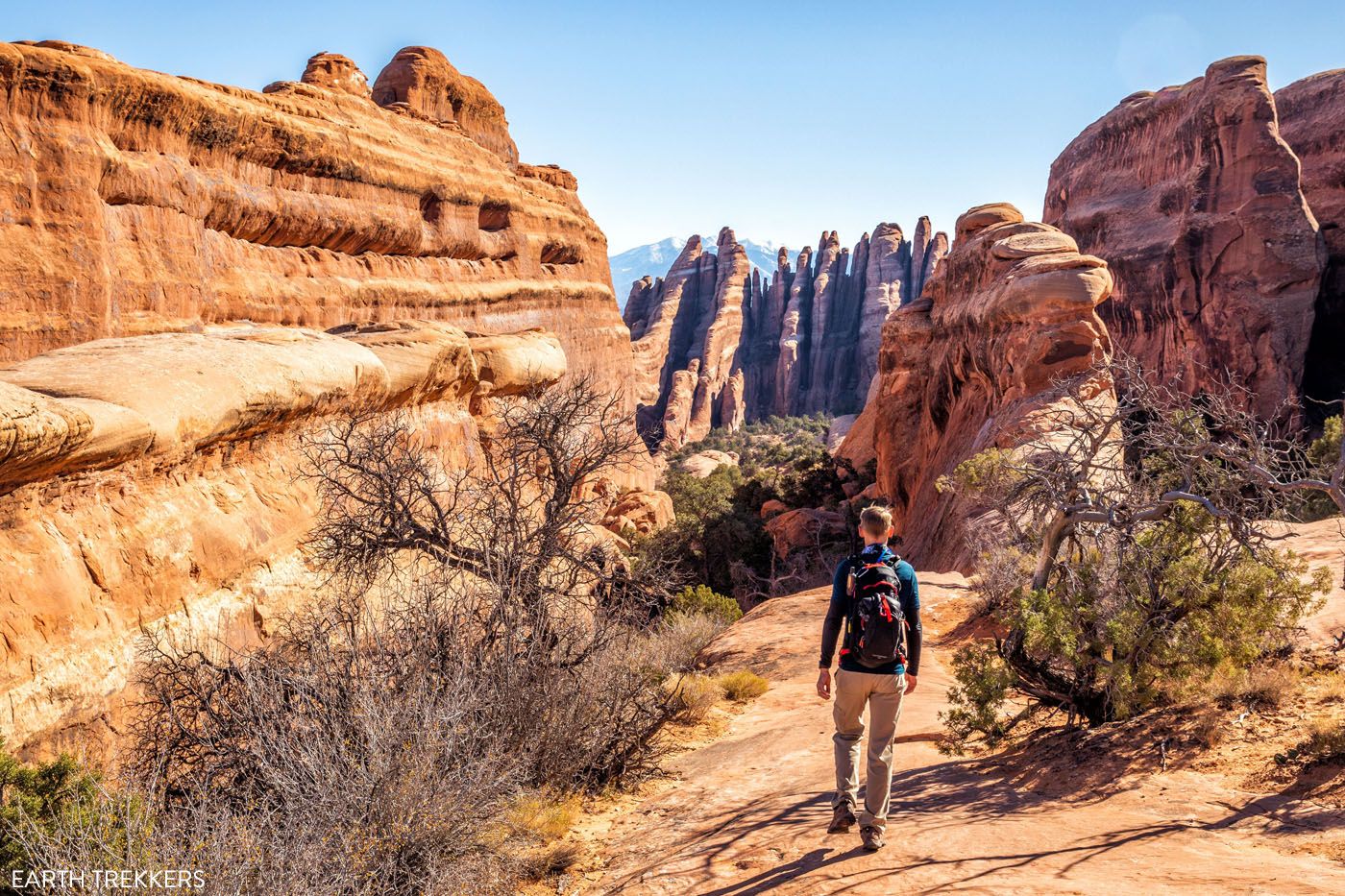
Devils Garden Trail | Best National Parks in January
Location: Utah
Top Experiences: Hike to Delicate Arch, see Balanced Rock and the Fiery Furnace, visit Double Arch, Turret Arch, and Windows Arch, hike Park Avenue.
Ultimate Adventure: Hike the Devils Garden Trail. To reach Landscape Arch, one of the most iconic arches in the park, it is only 1.6 miles round trip. But for the ultimate adventure, continue past Landscape Arch to Double O Arch and Dark Angel and return on the Primitive Trail.
How Much Time Do You Need? One day in Arches is all you need to see the highlights, but it will be a very busy day and you will need to get started at sunrise, since the length of the day is so short in January. With two days, you can visit the park at a more leisurely pace or go off the beaten path.
8. Mammoth Cave National Park
With over 400 miles of explored caves and passageways, Mammoth Cave is the world’s longest cave system. On a visit to Mammoth Cave, explore this subterranean world of immense rooms, long canyons, and tight passageways.
In order to explore Mammoth Cave, you will have to join a ranger-guided tour, of which there are many. Your options range from 2 to 3-hour, large group tours to small group tours where you can explore the caves with a hand-held lantern.
Why Visit Mammoth Cave in January: Mammoth Cave is 54°F all year. Even though cold weather and a chance of snow are a very real possibility in January, the cave stays a constant temperature, so the time of year matters very little for cave tours, at least in terms of temperature. Like other parks on this January list, visitation is low at Mammoth Cave for January. So, take advantage of lower crowds in January and there is a good chance you can tour the cave in a smaller group than the summer months.
Weather: In January, the average high is only 48°F (9°C) and the average low is 29°F (-1.5°C). There is a chance of snow but usually it is a cold rain this time of year. There are above ground trails to hike, but if it is cold during your visit, you can stick with the cave tours, which is the main reason for visiting Mammoth Cave National Park.
Sunrise and sunset: Sunrise is at 8 am and sunset is at 5:45 pm.
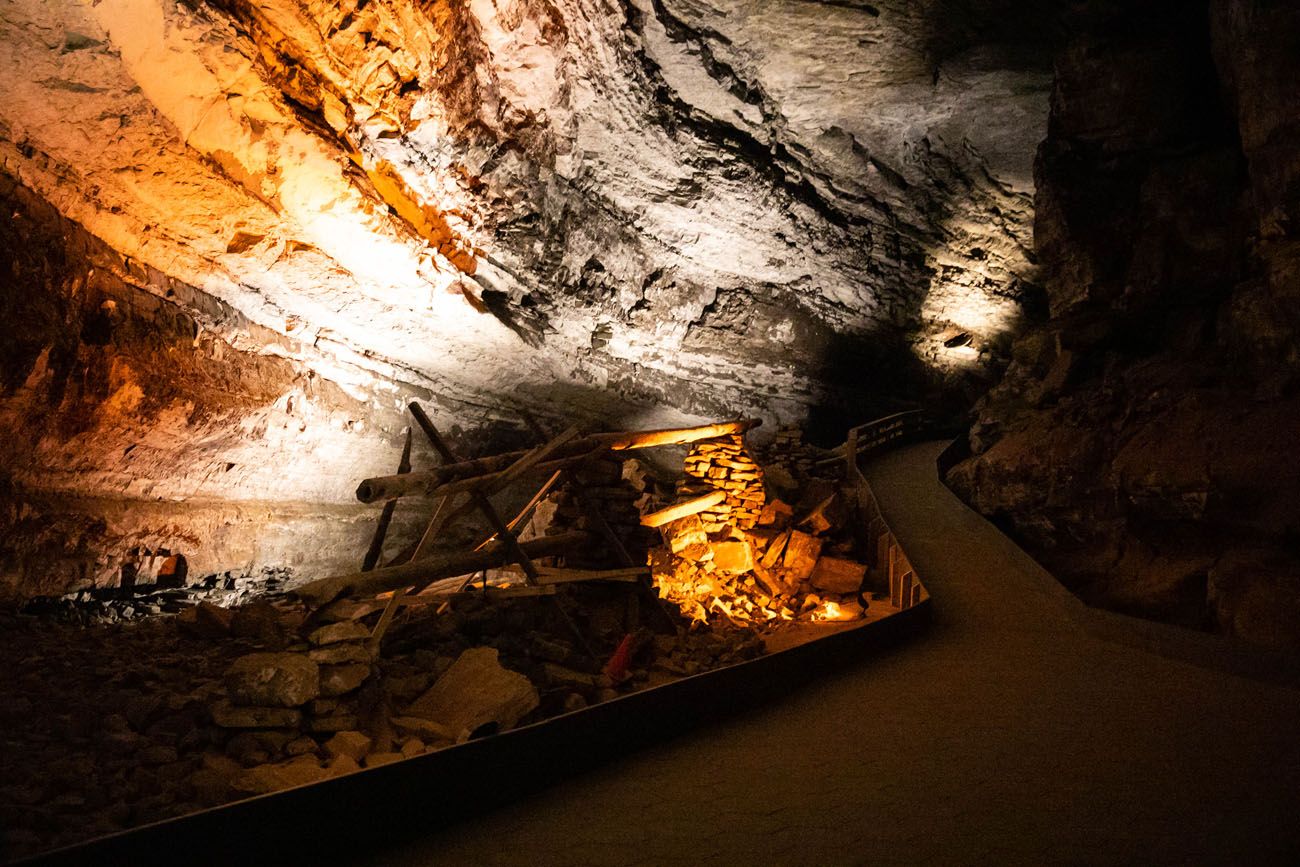
Mammoth Cave | Best National Parks in January
Location: Kentucky
Top Experiences: Take a ranger guided tour of the cave. Tours range from 30 minutes to 6 hours, depending on the tour and how much of the cave you want to explore.
Ultimate Adventure: Take the Wild Cave Tour. On this small group, 6-hour tour, you get to learn what it is like to be cave explorer. While wearing kneepads, a miner’s headlamp, and a hard hat, you will belly crawl through tight spaces less than one foot high, scramble over rocks and climb up cave walls, and squeeze yourself through narrow spaces.
How Much Time Do You Need? A half day to a full day is all you need to visit Mammoth Cave National Park. We visited this park on a Tennessee – Kentucky road trip, traveling next to Nashville.
Plan Your Visit
9. Grand Canyon National Park
Words and photos cannot accurately describe what it is like to look out across the Grand Canyon for the first time. This is a place that needs to be seen in person to truly appreciate the immense beauty of this place.
Grand Canyon National Park is one of the most visited parks in the USA. People from all over the world travel here to see this place. The Grand Canyon is one of the Seven Natural Wonders of the World and a UNESCO World Heritage Site.
In the Grand Canyon, there are several rims to visit. The South Rim, with its overlooks and hiking trails, is the most popular to visit and the views from here are some of the best. Most visitors spend their time on the South Rim when they visit the Grand Canyon.
Why Visit the Grand Canyon in January: The Grand Canyon is busy all year, but January and February are the quietest months to visit this national park (July typically gets the most visitors). January is also the coldest month of the year to visit the Grand Canyon, so keep that in mind. Even though it is located in Arizona, the South Rim is at a high elevation and this keeps temperatures lower than places like Saguaro National Park and Phoenix. But if you want to visit the Grand Canyon with low crowds, January is one of the best months to go.
Weather: The average high is only 44°F (7°C) and the average low is 20°F (-7°C). Snow is also a possibility this time of year.
Sunrise and Sunset: Sunrise is at 7:30 am and sunset is at 5:30 pm.
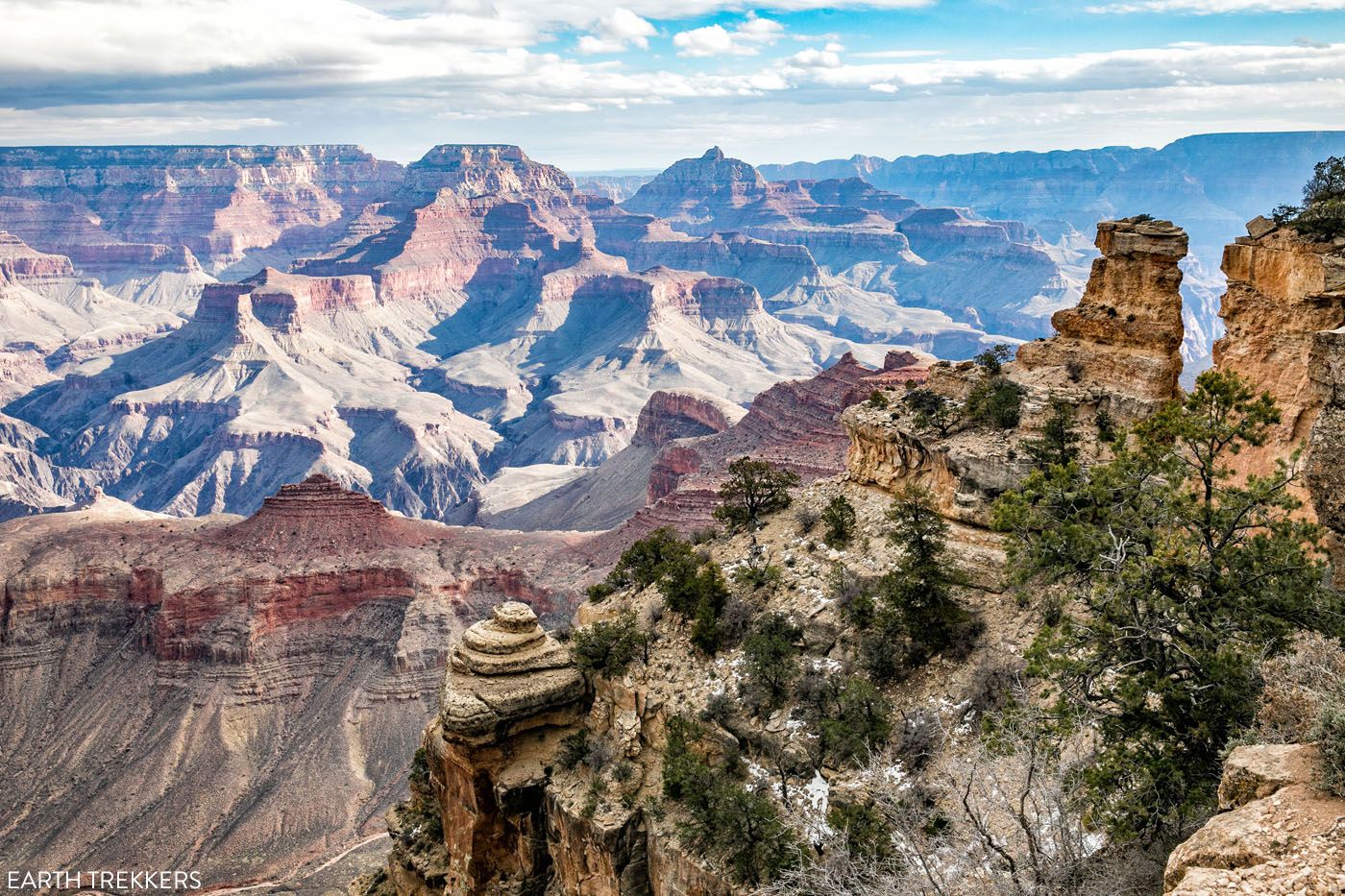
Grand Canyon | Best National Parks in January
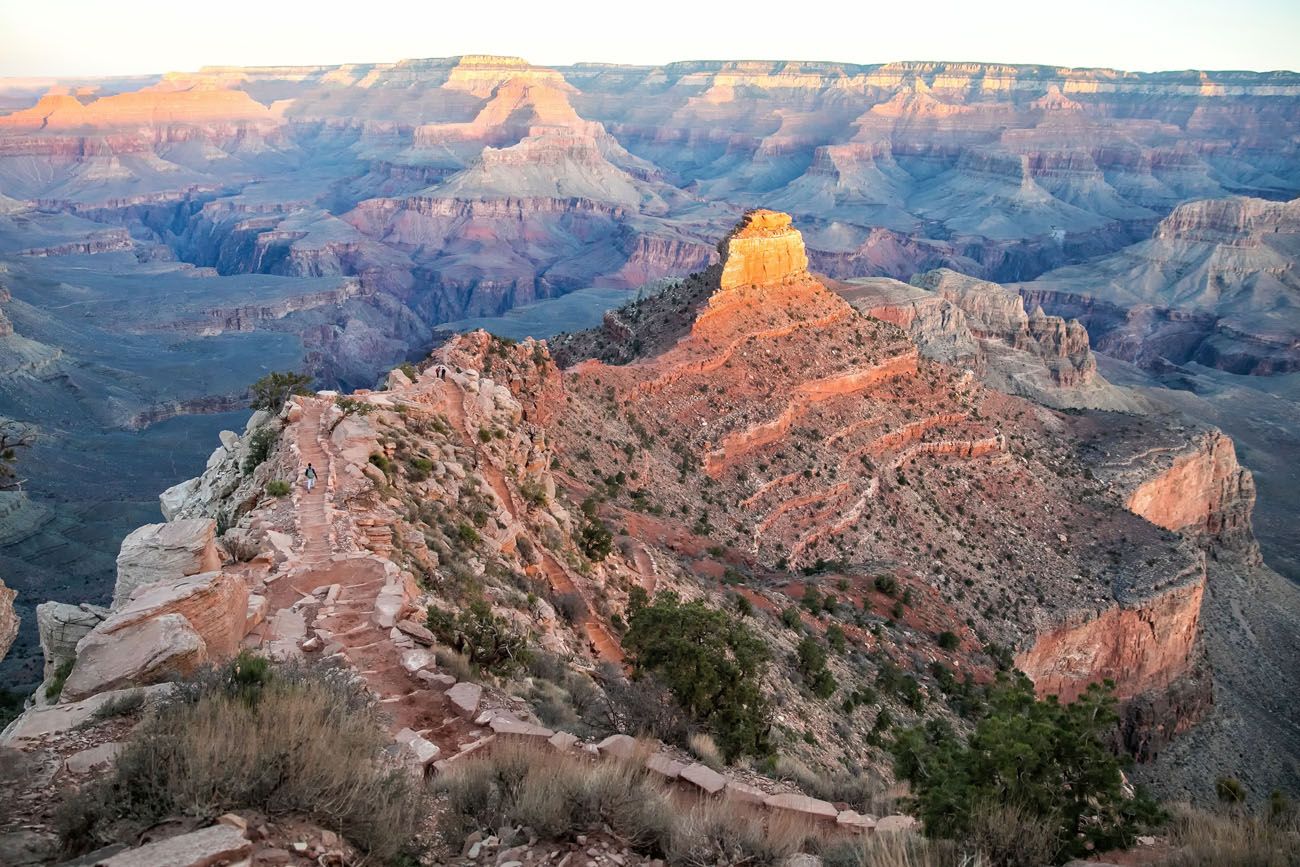
South Kaibab Trail at sunrise | Best National Parks in January
Location: Arizona
Top Experiences: Visit the South Rim viewpoints, watch the sunrise and/or sunset, hike below the rim on the Bright Angel or South Kaibab Trail, take a flightseeing tour by airplane or helicopter.
Ultimate Adventure: In the winter, hike the South Kaibab and Bright Angel Trails as one big loop. This is a big day hike and only those who are very fit with lots of hiking experience should attempt it.
How Much Time Do You Need? We recommend spending two to three days on the South Rim, to visit the highlights. Three days gives you enough time to visit the best overlooks on the South Rim, go on a helicopter ride, and spend some time hiking below the rim.
10. Haleakala National Park
Haleakala is a massive volcano that makes up more than 75% of the island of Maui.
Watching the sun rise above the clouds and hiking into the crater are two of the best things to do in Haleakala National Park, but there is more to this park than visiting the summit of a volcano. You can also visit the lush forests and waterfalls in the Kīpahulu District, which is located along the Road to Hana.
Why Visit Haleakala in January: For those who live in an area with cold winters, Hawaii is a great place to escape snow and chilly temperatures. January also tends to be the month with the lowest visitation of the year.
Weather: The temperature can vary dramatically between the Haleakala summit and the towns and beaches on Maui. At the summit, the average high temperature is 61°F (16°C) and the average low is 44°F (7°C). In Kahului, the average high is 90°F (32°C) and the average low is 64°F (18°C). That’s a big difference! January is one of the wettest months to visit Maui, so you could have some rain in your forecast.
Sunrise and Sunset: Sunrise is at 7 am and sunset is at 6 pm.
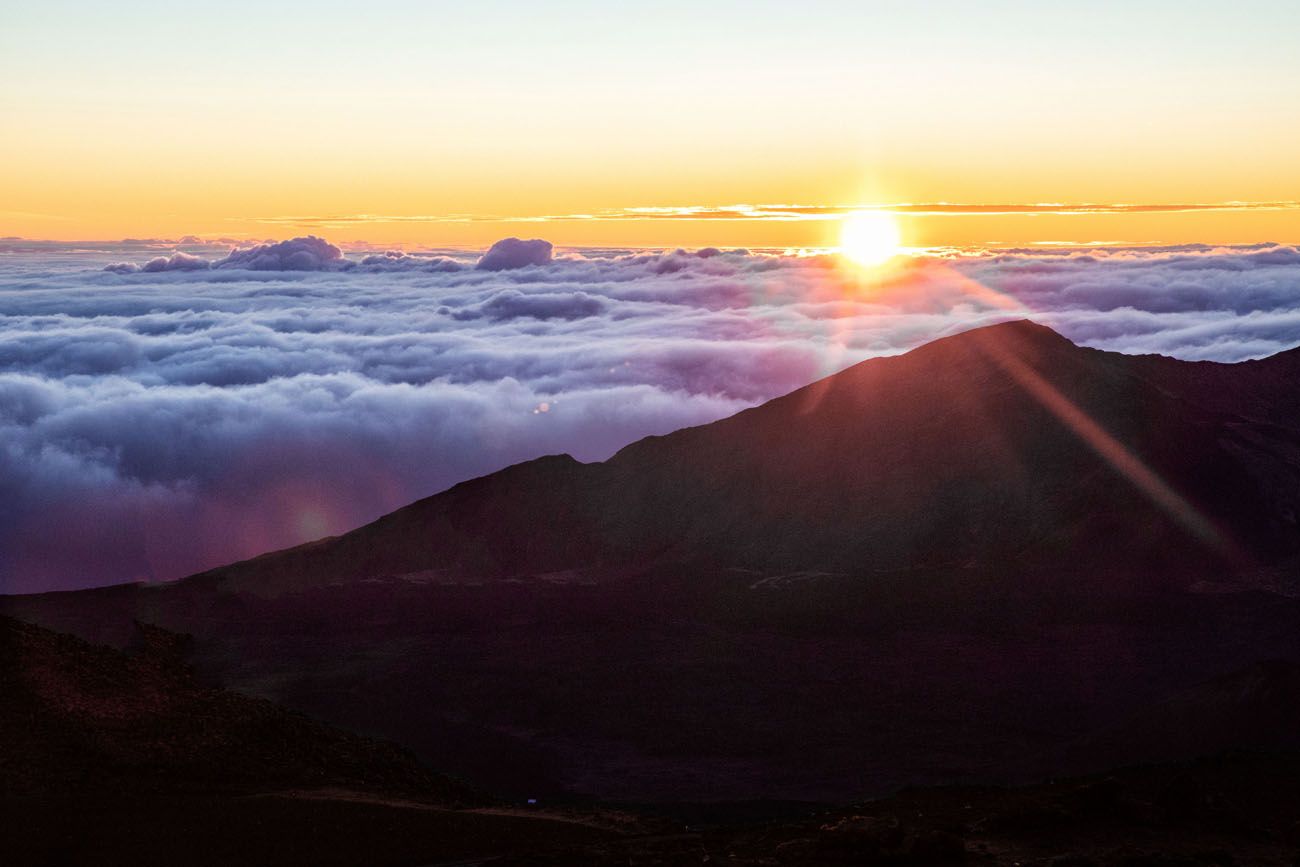
Sunrise at Haleakala National Park | Best National Parks in January
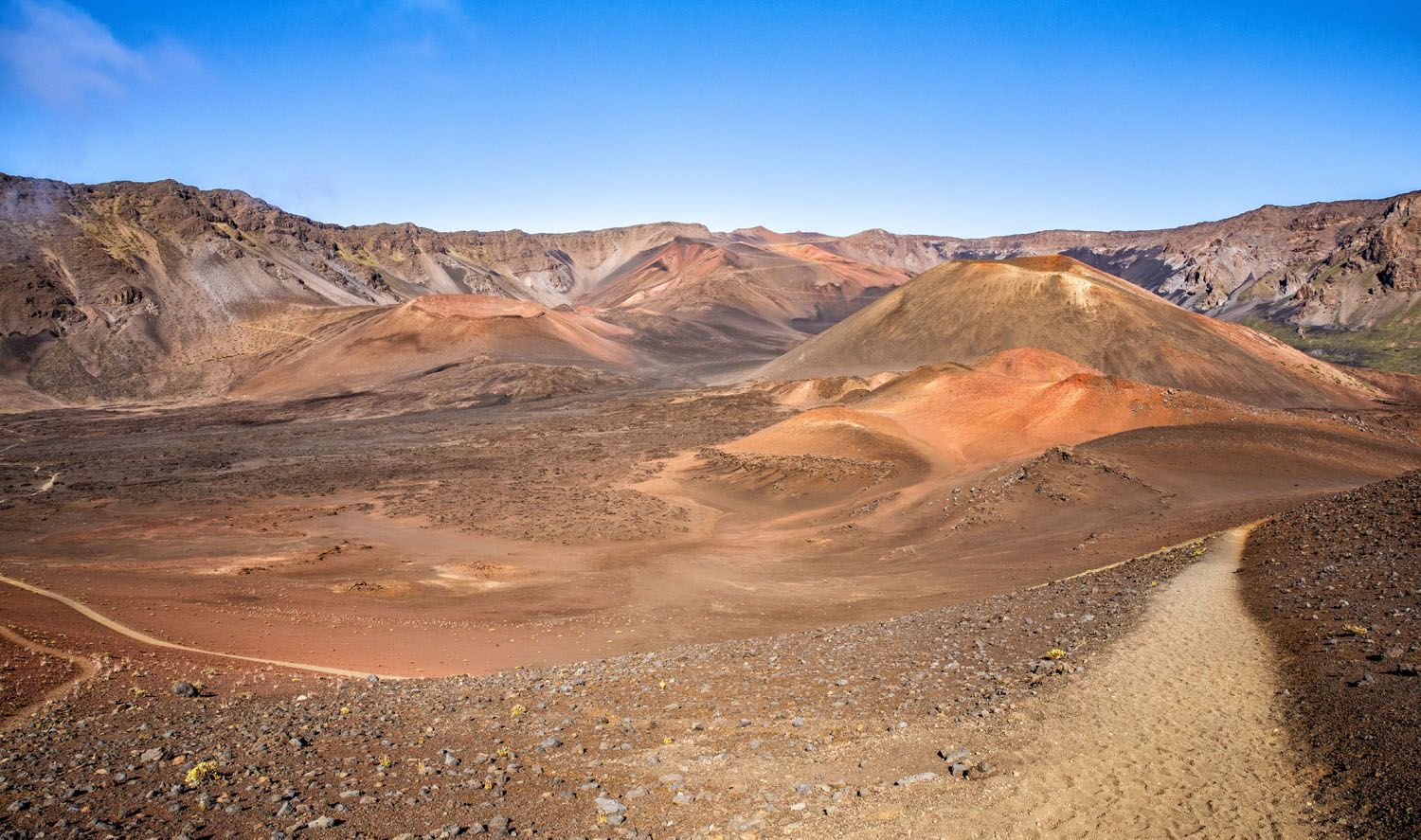
Hiking in the Haleakala Crater | Best National Parks in January
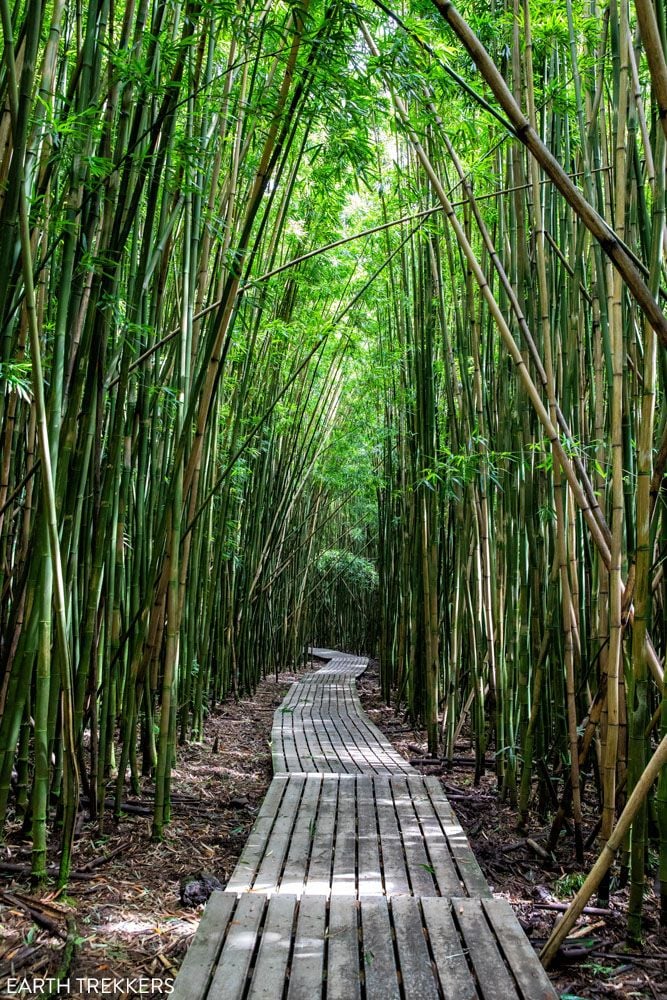
Pipiwai Trail | Best National Parks in January
Location: Hawaii
Top Experiences: Watch the sunrise above the clouds, visit the viewpoints on the Haleakala summit, hike the Pīpīwai Trail, visit the Seven Sacred Pools of ‘Ohe’o, and go stargazing.
Ultimate Adventure: For the ultimate adventure, hike the Sliding Sands and Halemau’u Trail Loop. This trail takes you into the Haleakala Crater and at times it looks like you are hiking on the surface of Mars.
How Much Time Do You Need? If you want to visit both the Haleakala summit and the Kīpahulu District, you will need two full days in Haleakala National Park.
11. Hawaii Volcanoes National Park
Hawai’i Volcanoes National Park is home to two of the world’s most active volcanoes, Mauna Loa and Kīlauea. You also have the chance to catch Kīlauea in action, as molten lava oozes up from below the Earth’s crust.
But there is more to Hawai’i Volcanoes National Park than volcanic eruptions. You can hike through a lush rainforest and learn about the history and culture of this dynamic place.
This park has the unique ability to change dramatically in just a short period of time. In the past few decades, lava flows have covered roads and beaches, and earthquakes have disrupted the landscape. The conditions are constantly changing, so I recommend checking the National Park Service website for updates as you plan your trip.
Why Visit Hawai’i Volcanoes in January: Hawaii makes a great wintertime destination, for those who want to escape the cold temperatures at home. So why not add on one or two national parks to your visit? Crowd levels remain fairly consistent at Hawai’i Volcanoes National Park throughout the year, as does the weather. This park is generally warm all year and it gets a high amount of rainfall on a monthly basis.
Weather: The average high is 68°F (20°C) and the average low is 50°F (10°C). Rainfall averages 9 inches per month. For reference, the summer months are the drier months (rainfall averages 6 inches per month) and November and December tend to be the wettest months.
Sunrise and sunset: Sunrise is at 7 am and sunset is at 6 pm.
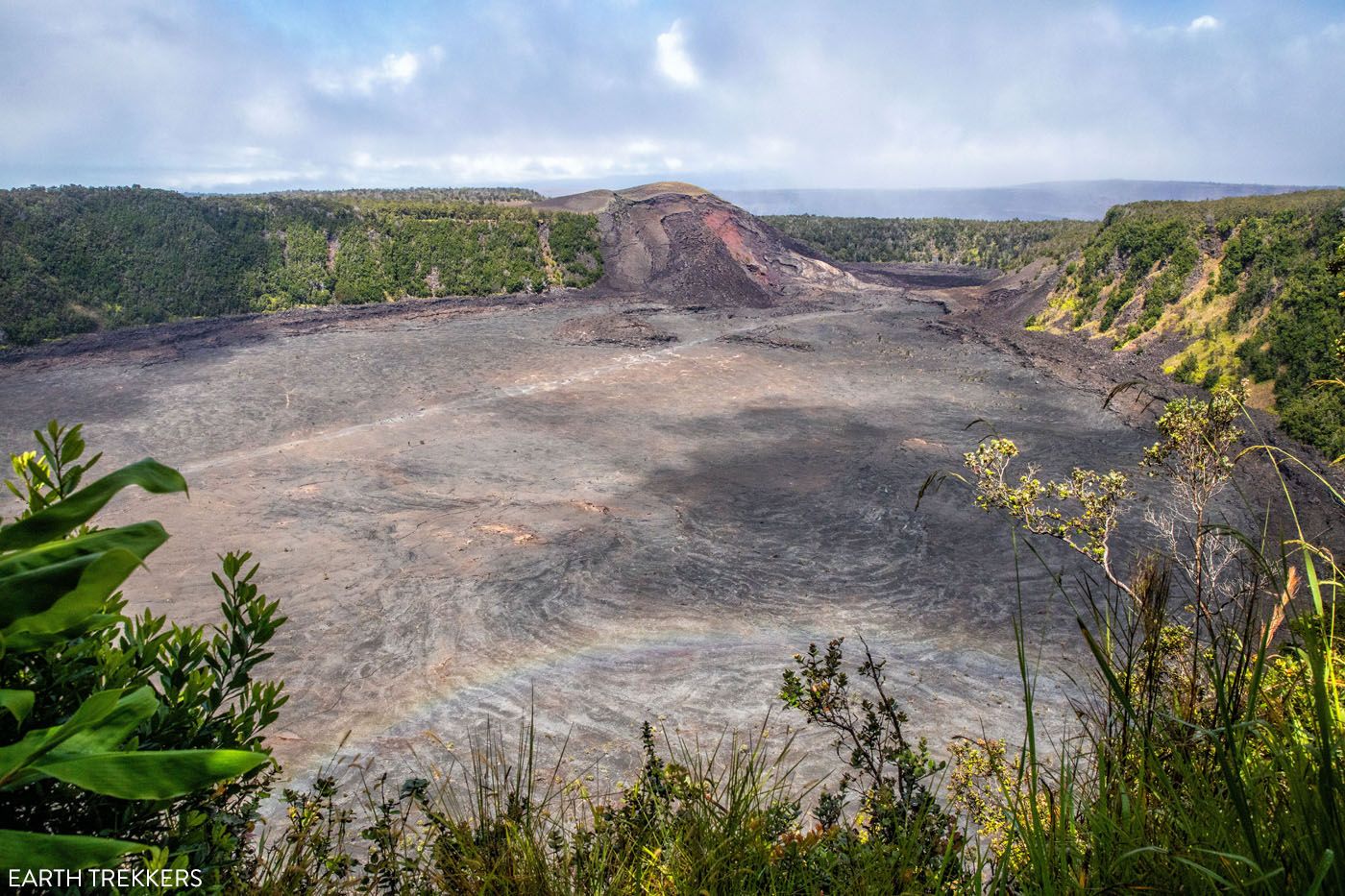
Kilauea Iki Crater | Best National Parks in January
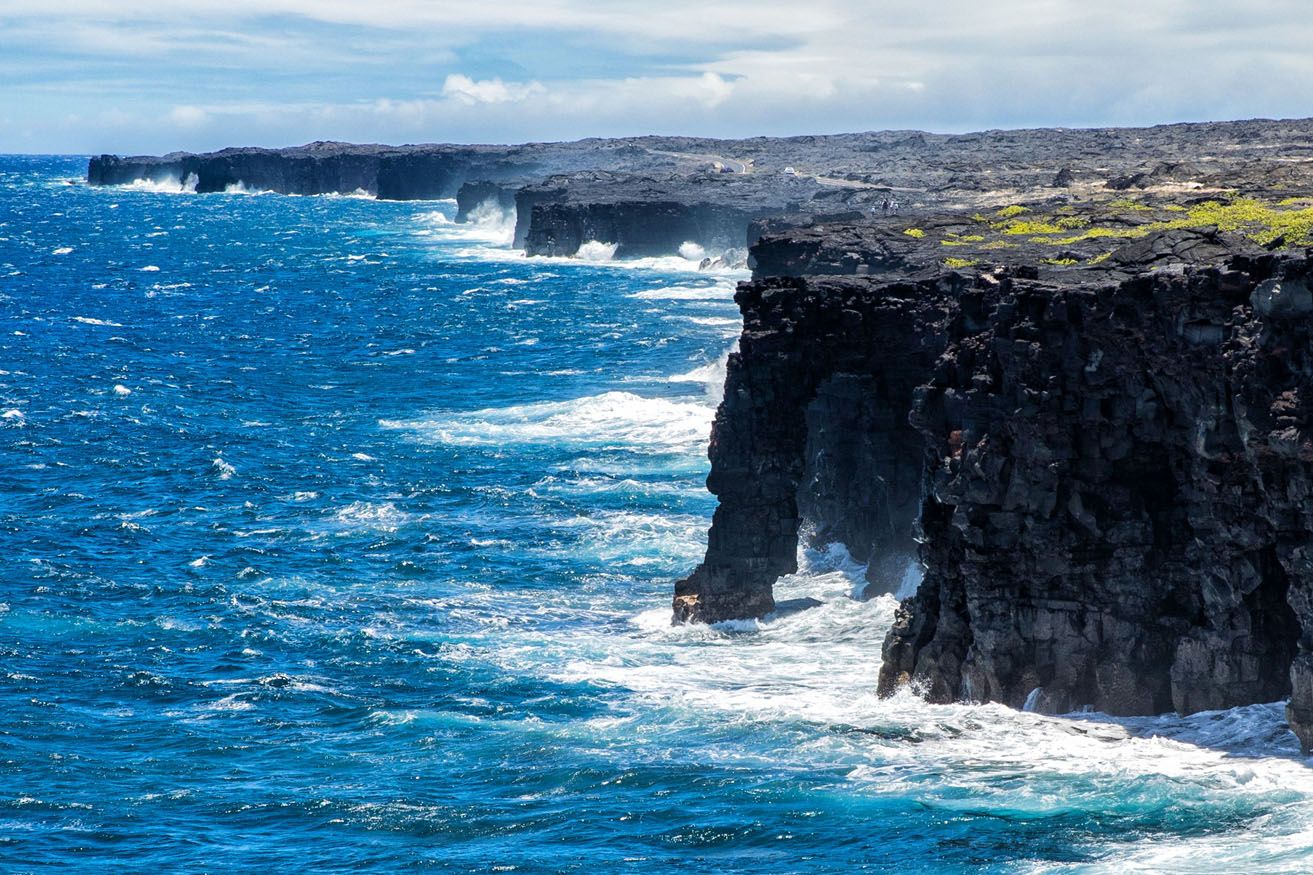
Holei Sea Arch | Best National Parks in January
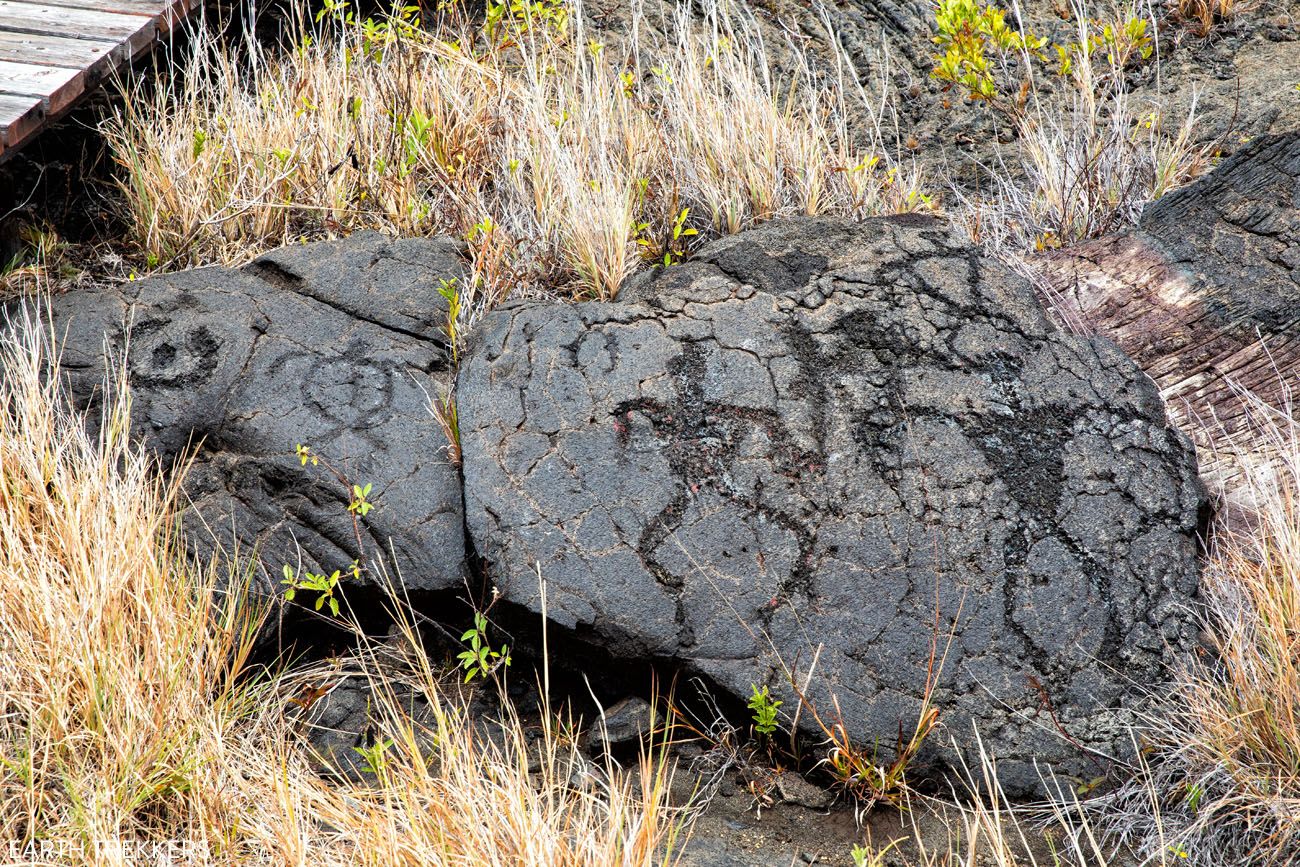
Pu’uloa Petroglyphs | Best National Parks in January
Location: Hawaii
Top Experiences: See the lava flow, drive Crater Rim Drive and visit the viewpoints, hike the Kīlauea Iki Trail, drive Chain of Craters Road, hike out to the Pu’uloa Petroglyphs, and walk through the Thurston Lava Tube.
Ultimate Adventure: Take a helicopter ride over the Kīlauea Caldera to see the lava (if it is flowing).
How Much Time Do You Need? To visit the main sights around the Kīlauea Caldera, one day is all you need. There are two less visited areas of the park, the Kahuku Unit and Mauna Loa, and if you plan to visit these, add on another day or two to your visit.
12. Joshua Tree National Park
With its desert scenery, hiking trails, rock climbing routes, hidden oases, scenic drives, and trees that look like they have been plucked from the pages of a Dr. Seuss book, Joshua Tree National Park is a joy to explore.
Hike the Arch Rock Trail, learn about the plants that thrive in the Mojave Desert on the Cap Rock Nature Trail, see Skull Rock, and go hiking in Hidden Valley. Our favorite experience is hiking the Hall of Horrors and searching for the hidden slot canyon.
Why Visit Joshua Tree National Park in January: This national park is located in southern California, so even in January, temperatures are relatively warm. Park visitation tends to be high from November through April, but crowds thin out just a little bit in January, making this month a great time to visit if you want mild temperatures and slightly lower crowds. You can also combine a visit to Joshua Tree with Palm Desert, San Diego, or Las Vegas (more great spots to visit in the winter).
Weather: The average high is 60°F (15°C) and the average low is 35°F (2°C).
Sunrise and Sunset: Sunrise is at 7:30 am and sunset is at 5:20 pm.
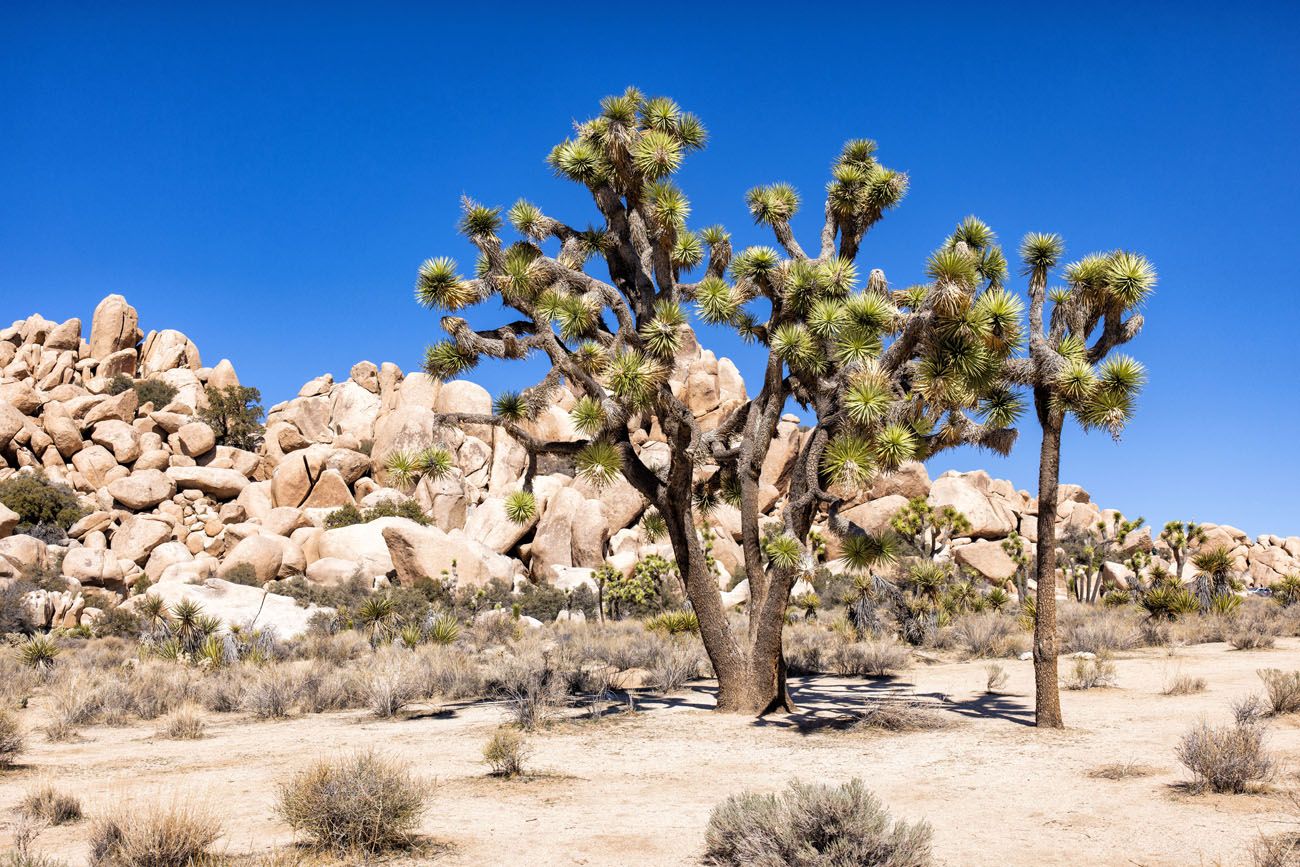
Joshua Trees | Best National Parks in January
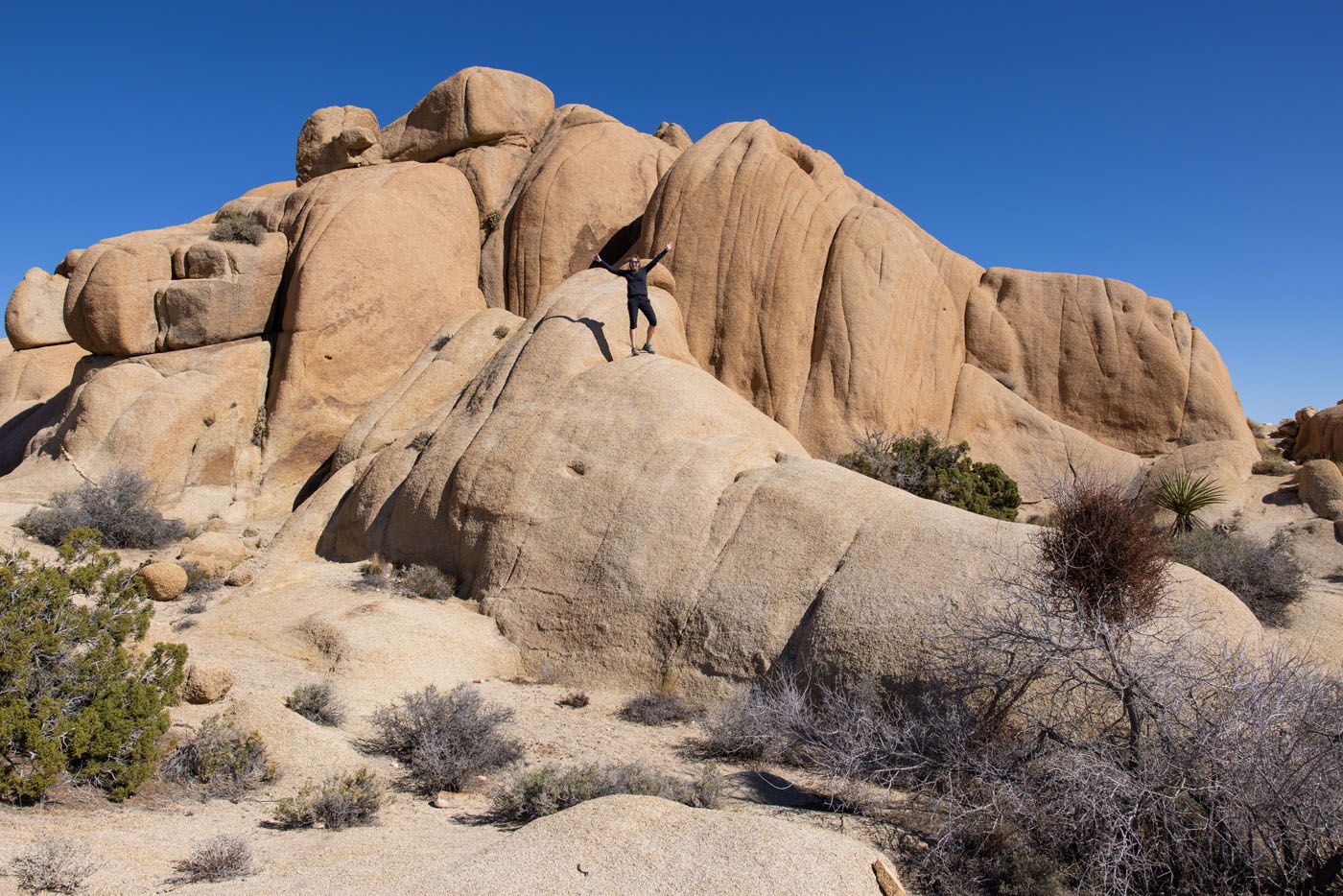
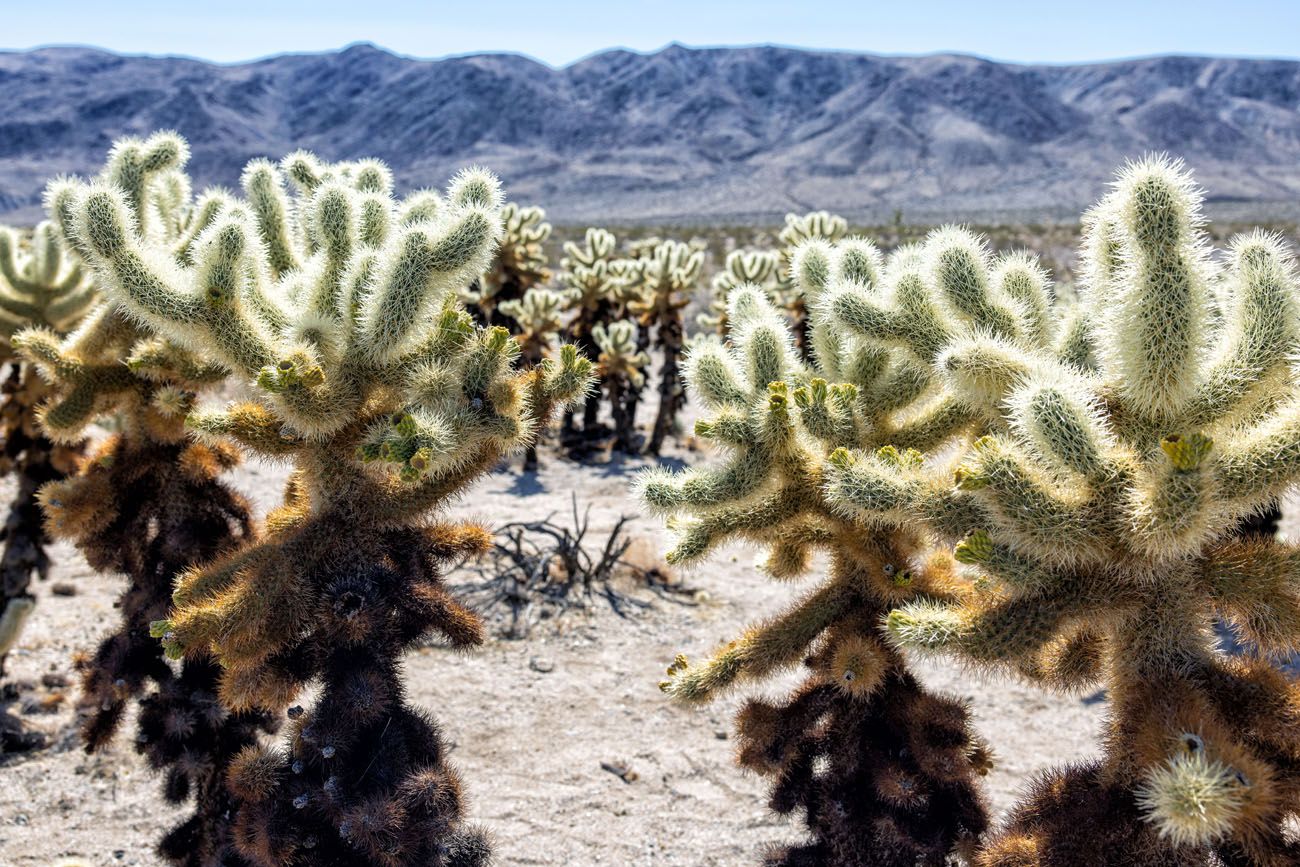
Cholla Cactus Garden | Best National Parks in January
Location: California
Top Experiences: Hike the Hall of Horrors, see Skull Rock, explore Hidden Valley, hike to an oasis, hike to Arch Rock and Heart Rock, drive Geology Tour Road, visit the Cholla Cactus Garden, and go stargazing.
How Much Time Do You Need? Ideally, you need at least two full days in Joshua Tree National Park. This gives you enough time to visit the highlights, go rock climbing or take a lesson, hike a few trails, and go on the scenic drives.
Bonus! 4 More Great National Parks to Visit in January
Here are three more great national parks to visit in January. Cooler temperatures in these parks kept them off the main list above, but they still make excellent wintertime destinations.
Capitol Reef National Park
Capitol Reef National Park is located in Utah, not far from Zion and Arches (mentioned above). This park tends to be colder, with the average high just getting up to 40°F and the average low at 20°F. Snow is likely this time of year. But if you are planning a Utah’s Mighty 5 road trip, Capitol Reef is worth the visit, even in January, just bring plenty of warm clothes.
Canyonlands National Park
Just like Capitol Reef, Canyonlands National Park was left off of the main list above because it is cold in January. It’s actually a few degrees colder in Canyonlands than Capitol Reef and snowfall is higher (Canyonlands on average receives 6 inches of snow in January). But if you have plans to visit Arches, Canyonlands is just a short drive away and worth it if you have the time.
PRO TRAVEL TIP: The Island in the Sky district of Canyonlands is colder than Arches and Capitol Reef because it sits at a higher elevation.
Biscayne National Park
Biscayne National Park, which is located in Florida, is 95% water. The best way, and really the only way, to explore this park is by boat.
In January, the high temperature is about 74°F. That’s relatively warm, but for some people, 74° might be too cool to spend a day on a boat, snorkeling and swimming.
However, if you have plans to visit the Florida Keys or the Everglades, it is worth adding on Biscayne if you have another day in your schedule.
Yellowstone National Park
If you are looking for a wintry national park to visit in January, Yellowstone makes a great pick. Travel by snowmobile in the park during the day and warm up by the fire at night. This is a trip that is on our to-do list…I would love to see the bison standing in the snow, their faces and fur covered with snow flakes.
January Road Trip Idea: Florida Keys
If you are looking for warm weather and some beach time, there’s no better road trip than a visit to the Florida Keys.
Spend a day or two in Miami before visiting Everglades and Biscayne National Parks. Drive through the Florida Keys, dine al fresco on the beach, and visit a state park or two along the drive. End your trip with a few days in Key West and make the day trip out to Dry Tortugas National Park.
For more information, read our Florida Keys Road Trip Itinerary, which provides several different ways to plan this trip.
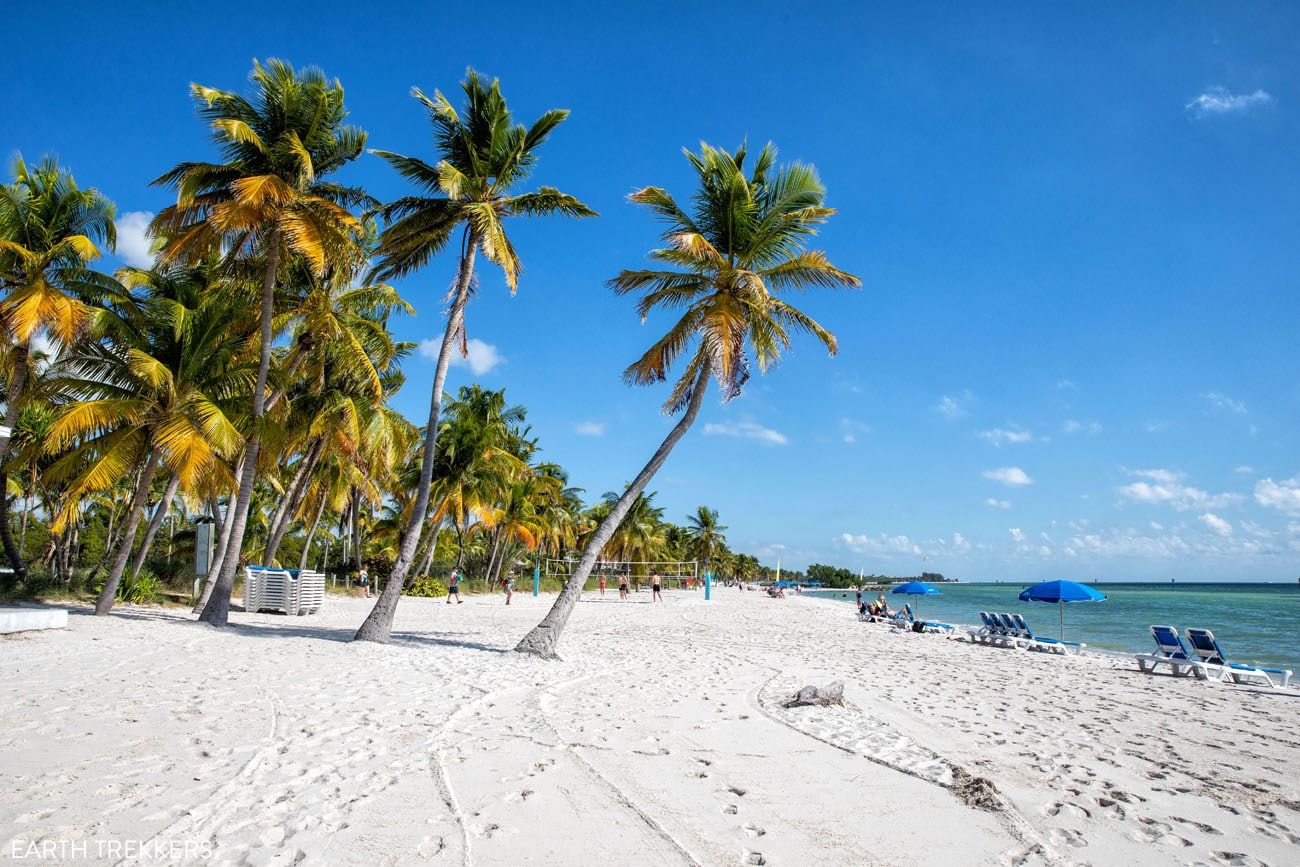
Key West
If you have any questions about the best national parks to visit in January, or if you want to share your favorite national parks to visit this month, let us know in the comment section below.
Best National Parks to Visit by Month:
FEBRUARY: Best National Parks to Visit in February
MARCH: Best National Parks to Visit in March
APRIL: Best National Parks to Visit in April
MAY: Best National Parks to Visit in May
JUNE: Best National Parks to Visit in June
JULY: Best National Parks to Visit in July
AUGUST: Best National Parks to Visit in August
SEPTEMBER: Best National Parks to Visit in September
OCTOBER: Best National Parks to Visit in October
NOVEMBER: Best National Parks to Visit in November
DECEMBER: Best National Parks to Visit in December
More Information about the National Parks
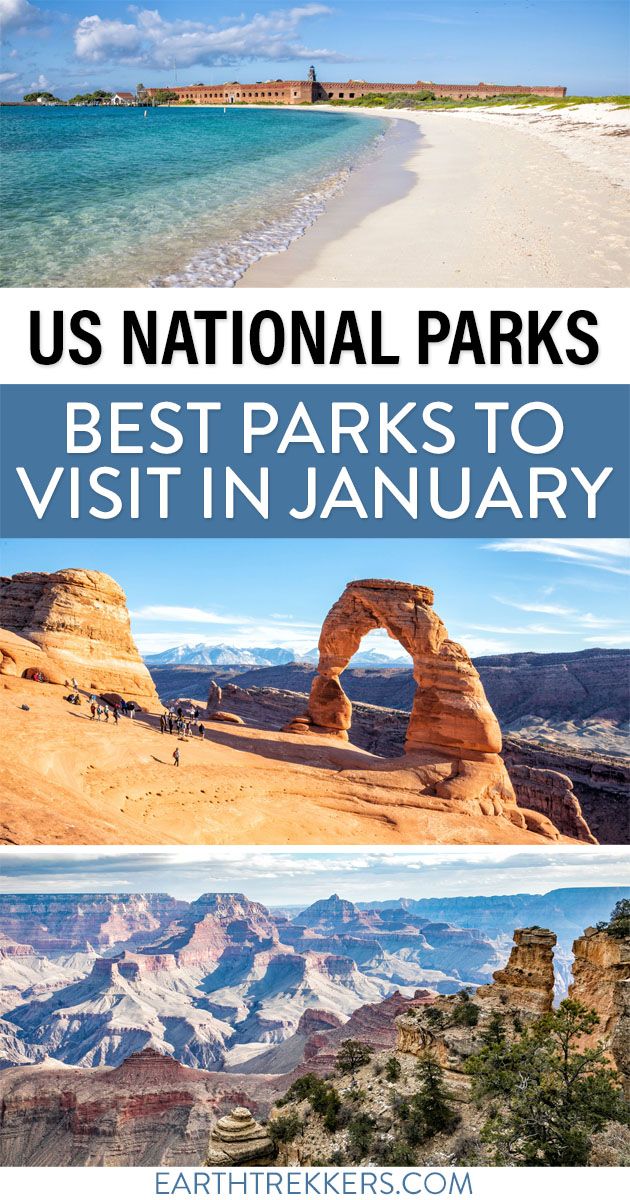
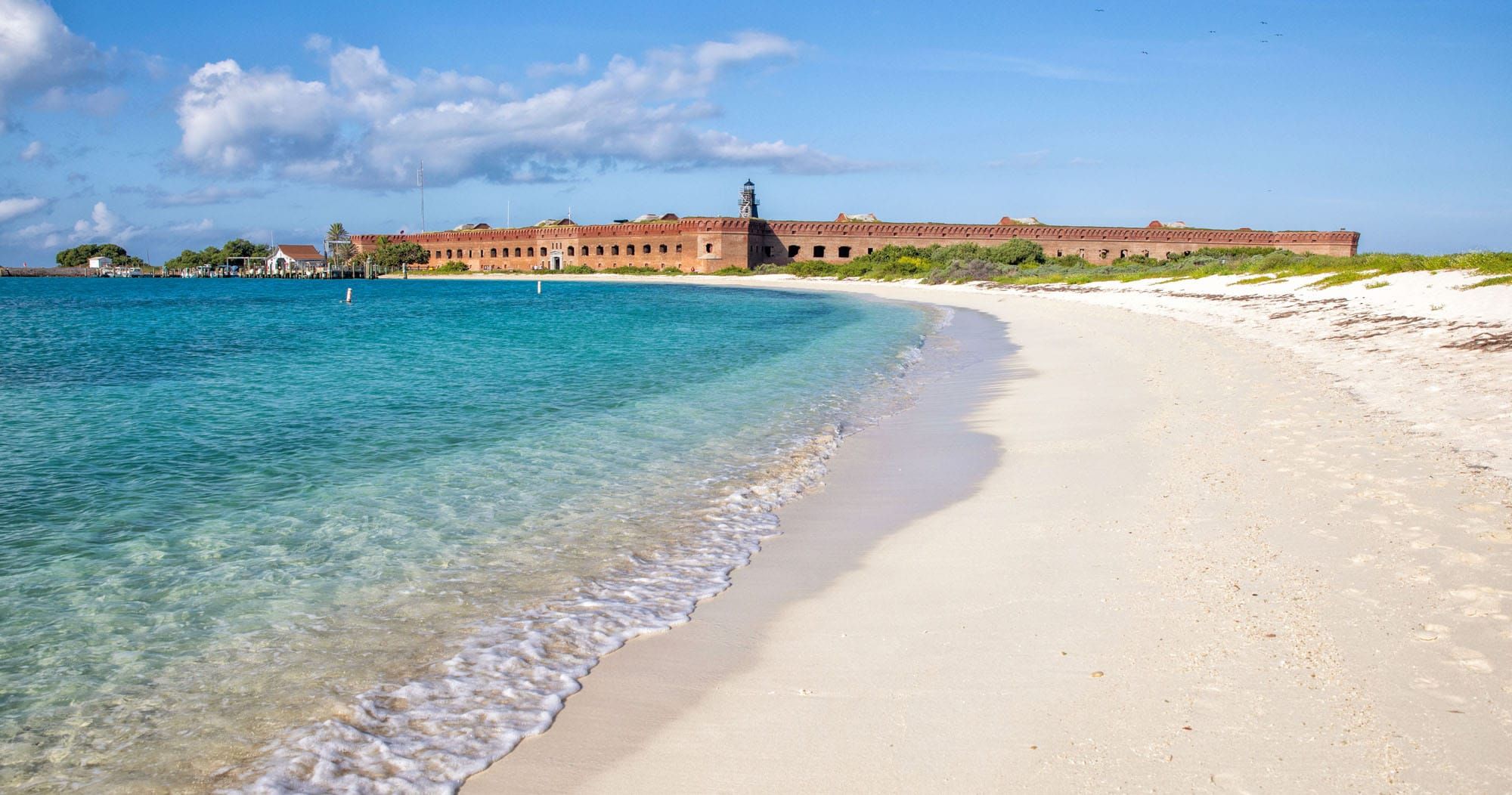
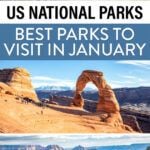
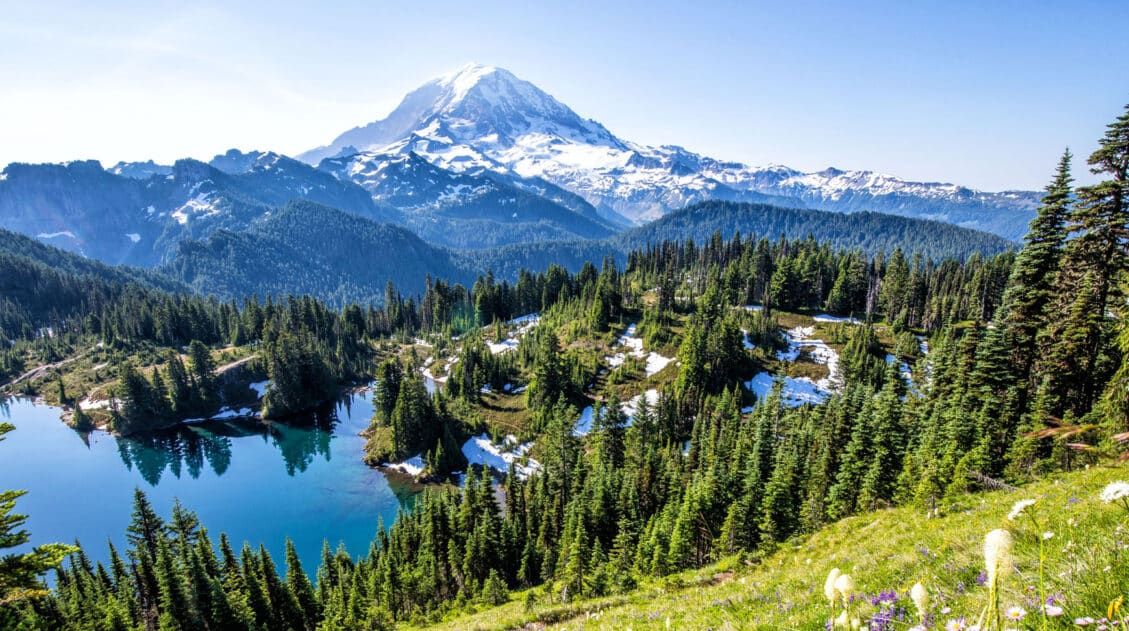
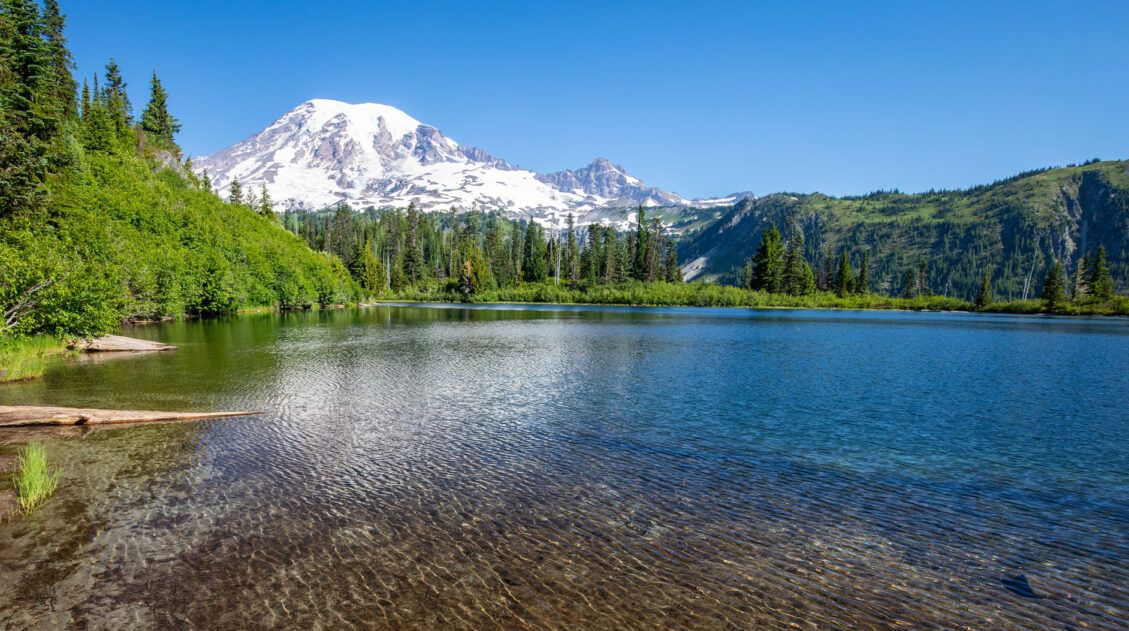
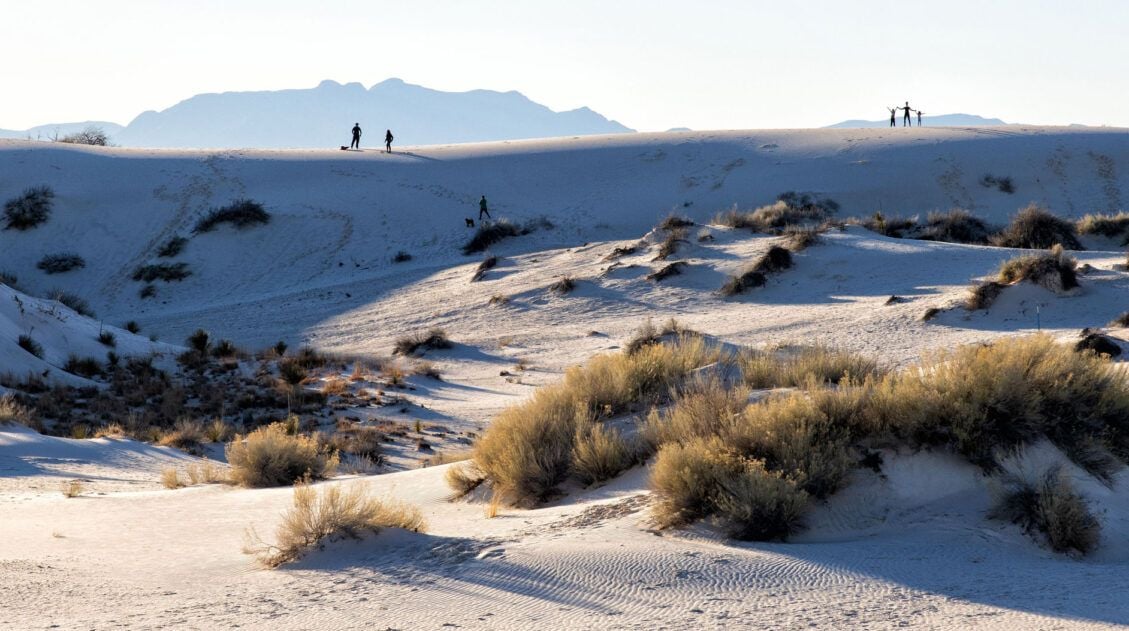
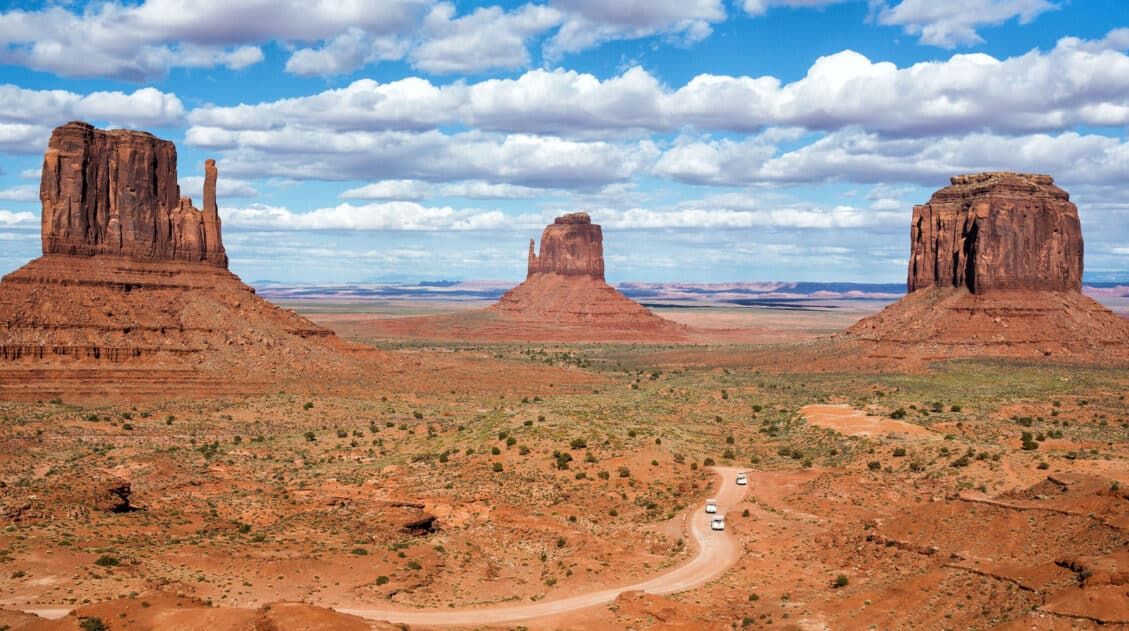
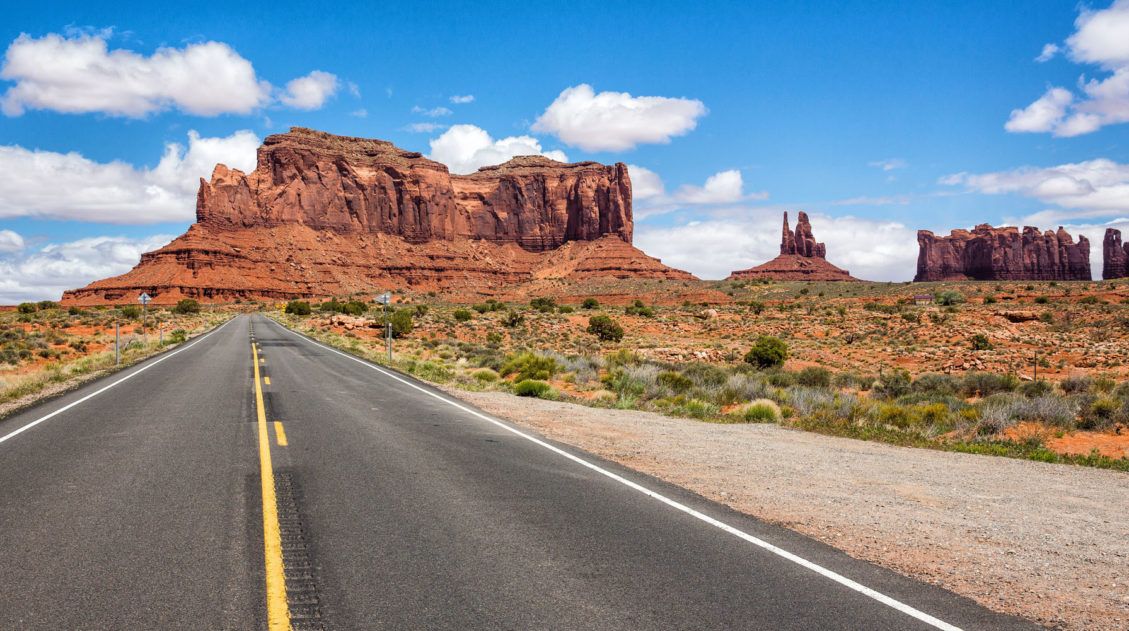
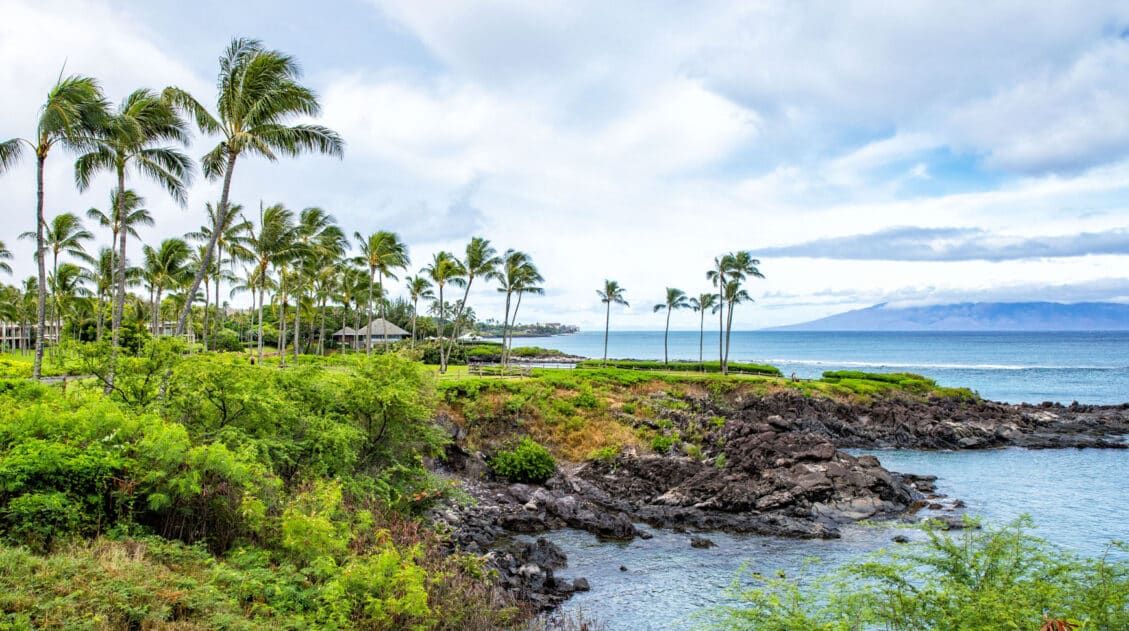
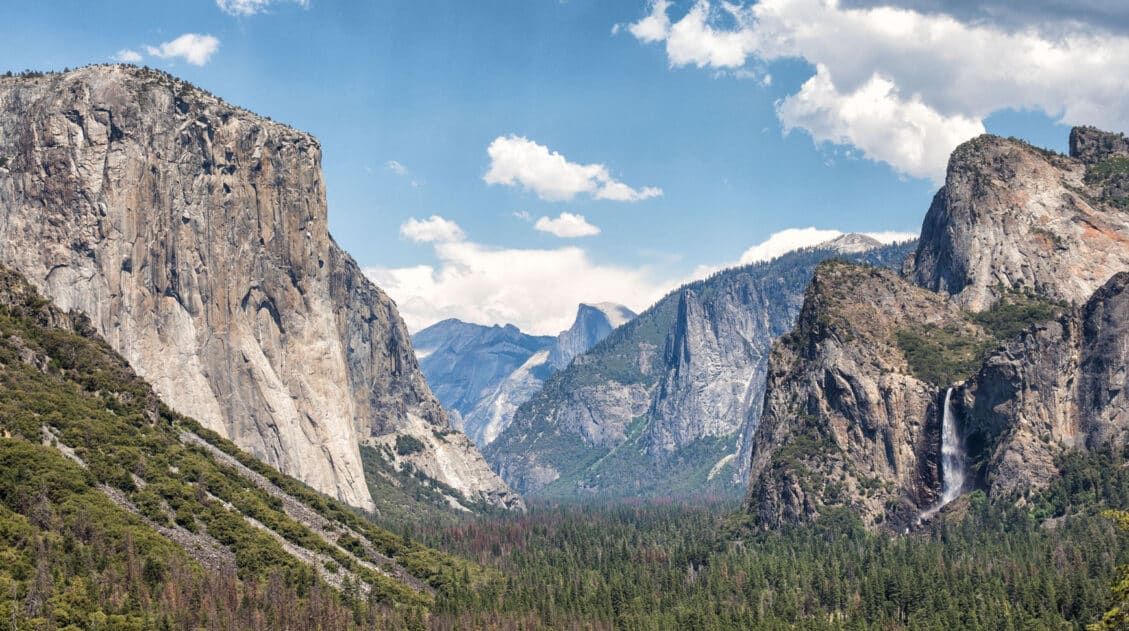
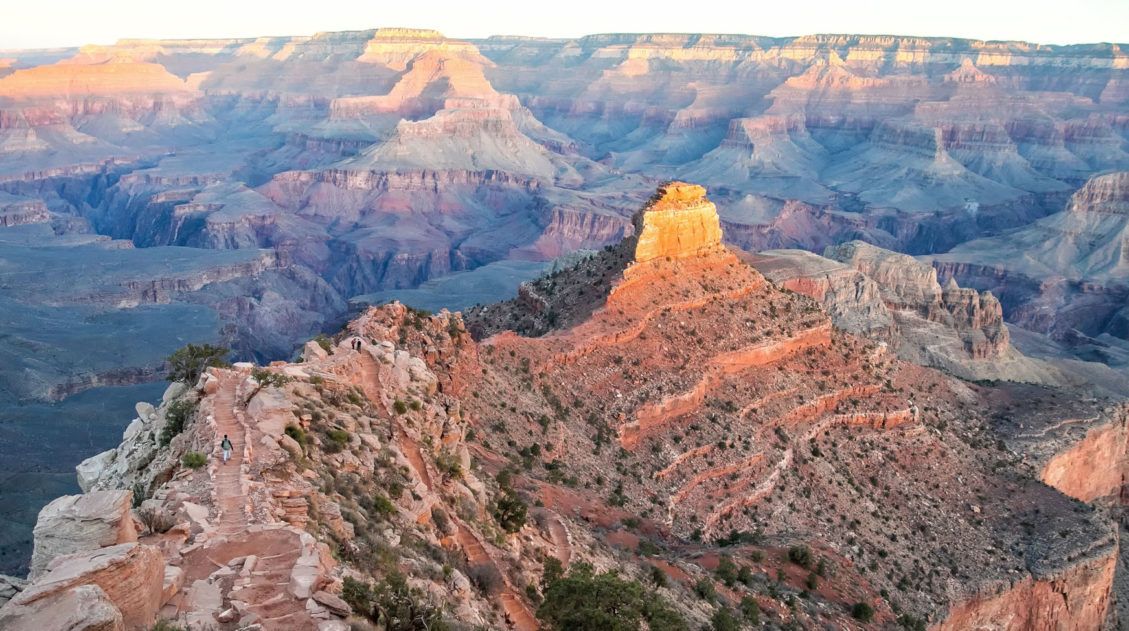
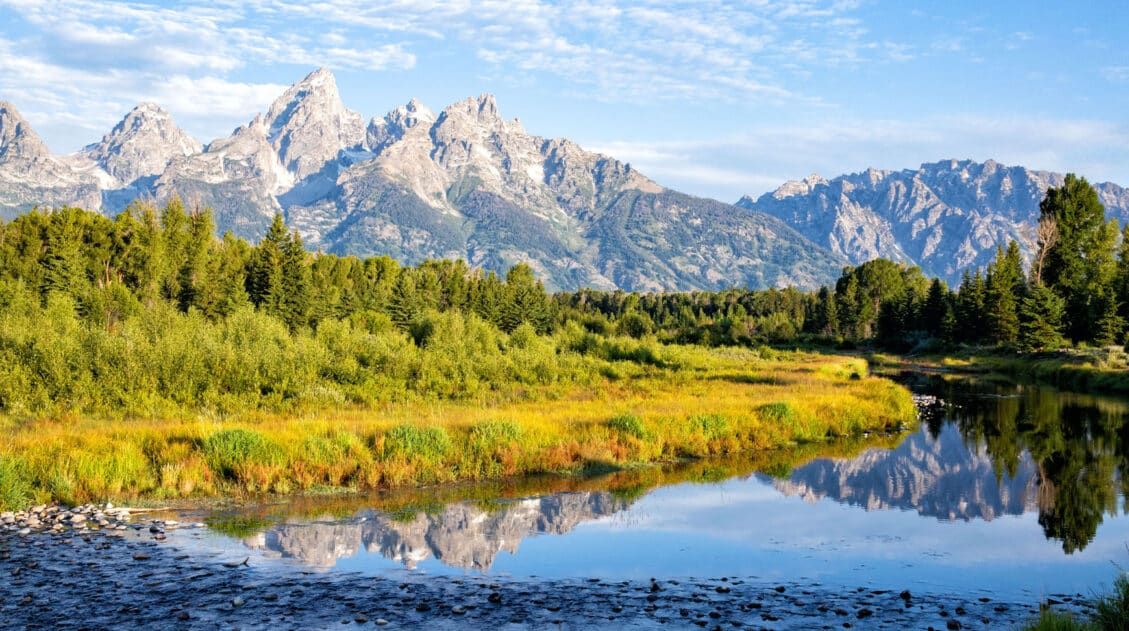
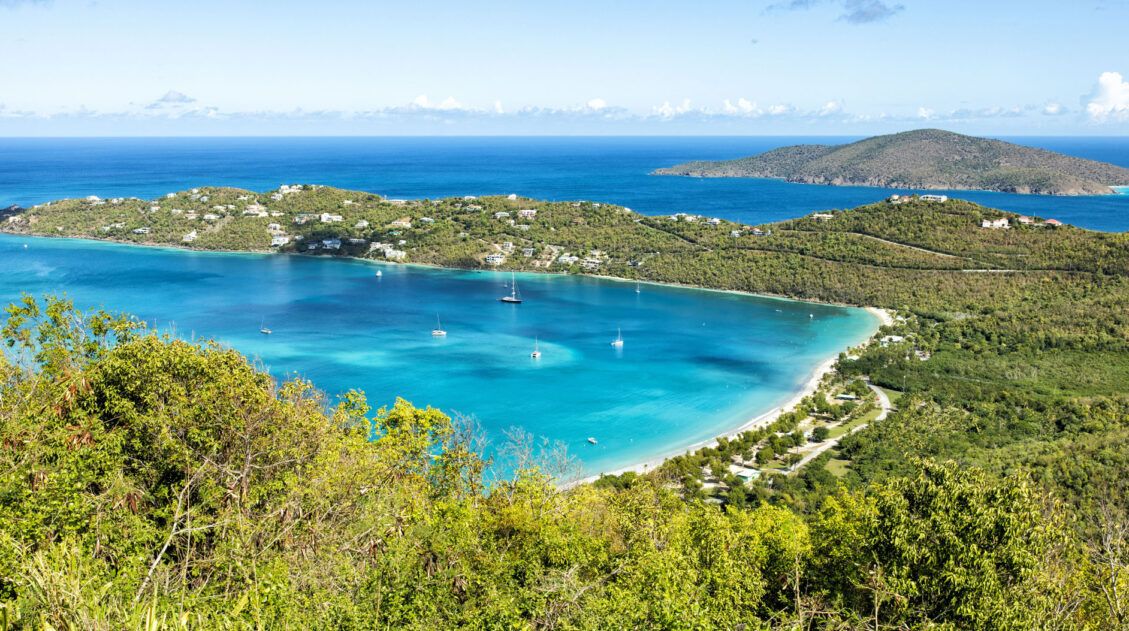
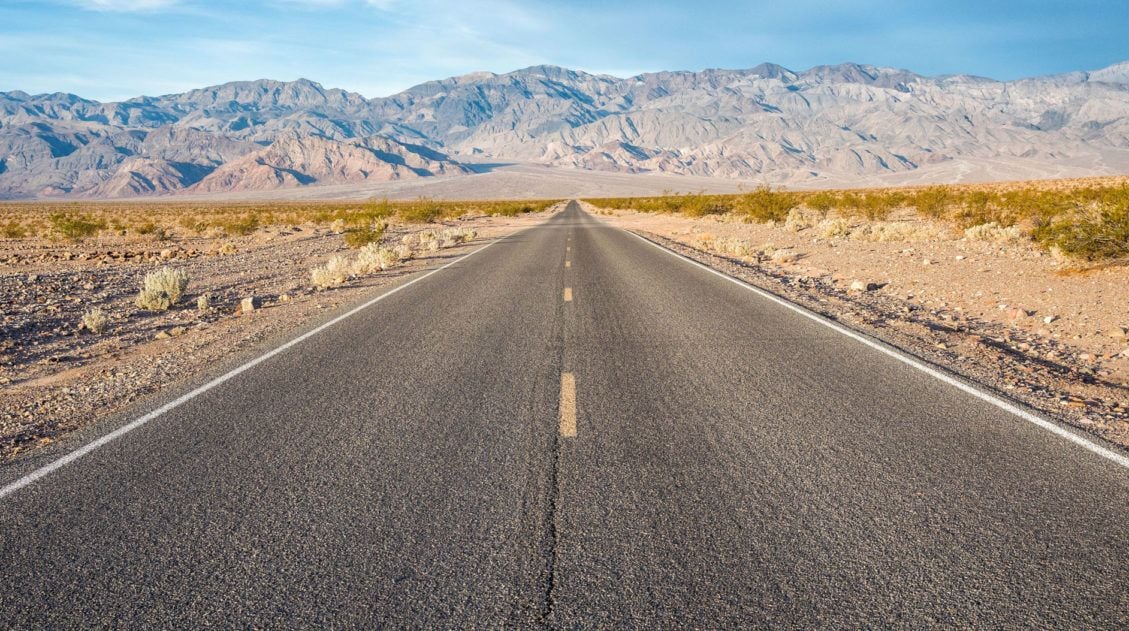
Comments 2